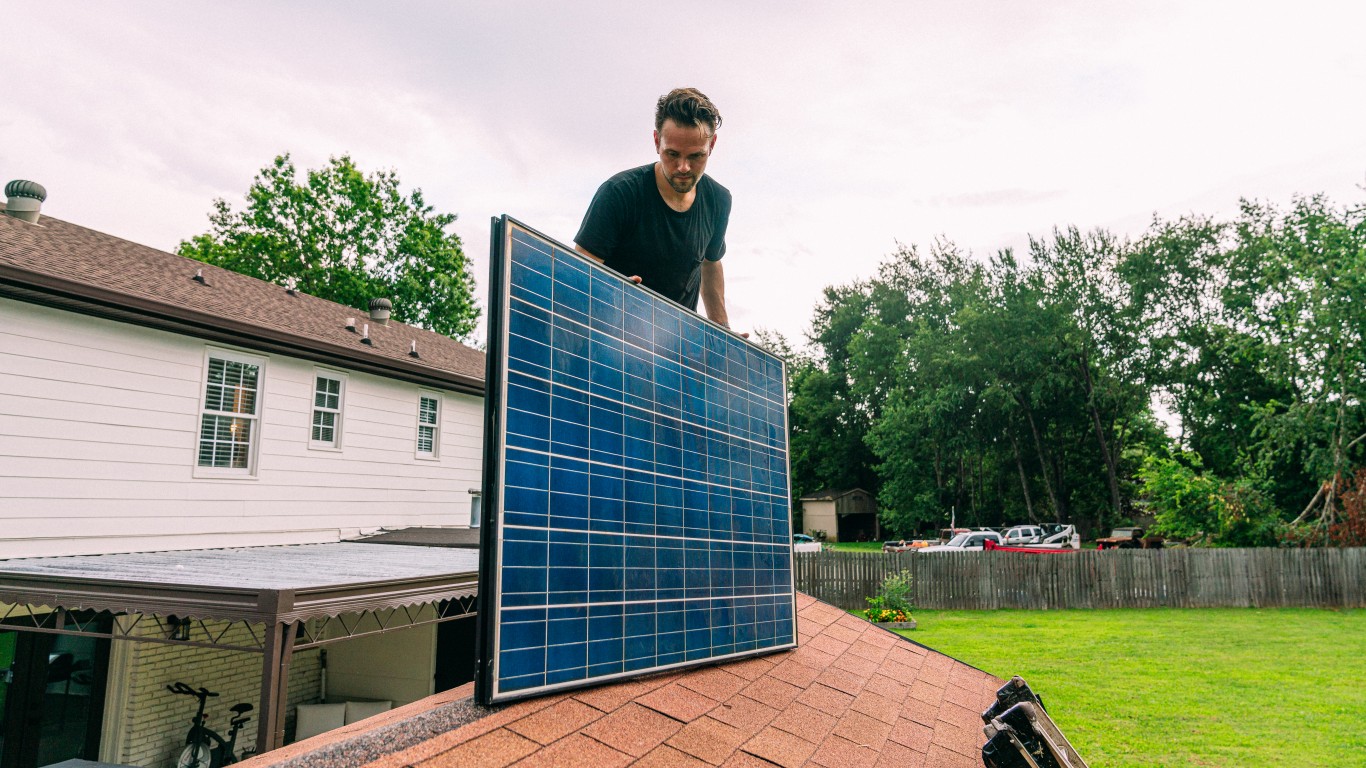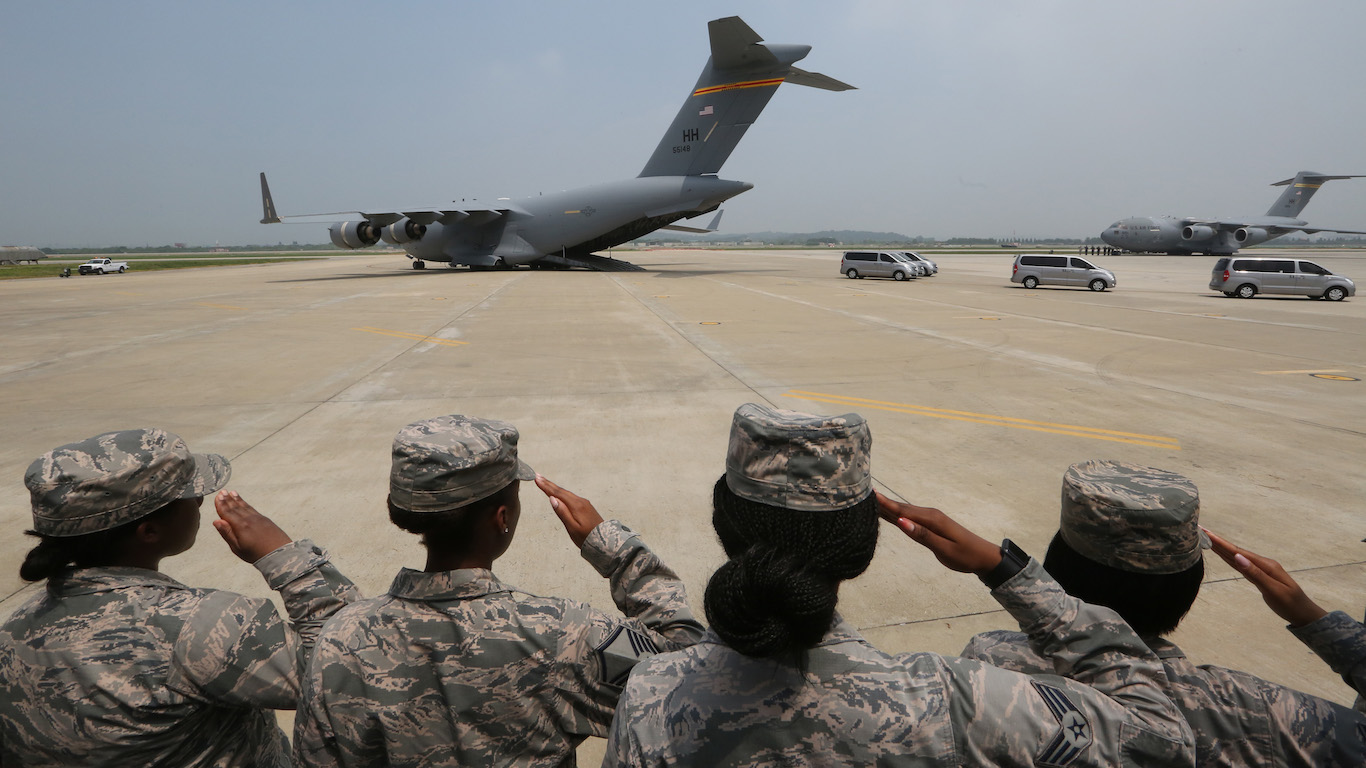
As the world’s preeminent military power, the United States is tasked with keeping its own defense and that of its allies, as well as providing peacekeeping forces all over the world.
To do this, America has established more than 400 military bases on every continent except for Antarctica.
America’s military presence is more pronounced in some countries than others. The nations where the United States has the most military facilities are often former adversaries. Other nations with many bases include places where the United States had fought — be it in the two world wars (among the costliest wars in U.S. history) or after. The U.S. military also maintains bases at previous Cold War hot spots and in strategic areas in the Middle East. The U.S. military also built facilities to test weapons in the Western Hemisphere. The presence of the U.S. military has been a source of tension in some of the countries, and many of them do not respect America.
These facilities are used for training and deploying troops, for maintaining and testing weapons systems, for research and education, and operational support. Given the space requirements for these exercises, the physical size of these installations can be considerable. According to the Department of Defense’s Base Structure Report for fiscal year 2018, the approximate value of all military facilities is $749 billion. These bases comprise about 2.3 billion square feet.
24/7 Wall Street has compiled a list of countries with the most U.S. military bases using data from the Department of Defense’s Base Structure Report for fiscal year 2018. The DoD defines an installation as any military base, camp, post, station, yard, center, homeport facility for any ship, or other activity under the jurisdiction of the DoD, including leased spaces that are controlled by or primarily support DoD’s activities.
An installation may consist of one or more sites. The number of total acres at the site includes government-owned land, public land, public land withdrawn for military use, licensed and permitted land, and acreage of foreign land used by DoD. Only foreign installations that are at least 10 acres in size or are worth at least $10 million to replace were considered in our count. For the purposes of this list, we did not consider installations on the U.S. territories or possessions Guam, Puerto Rico, Marshall Islands, Northern Mariana Islands, or Virgin Islands.
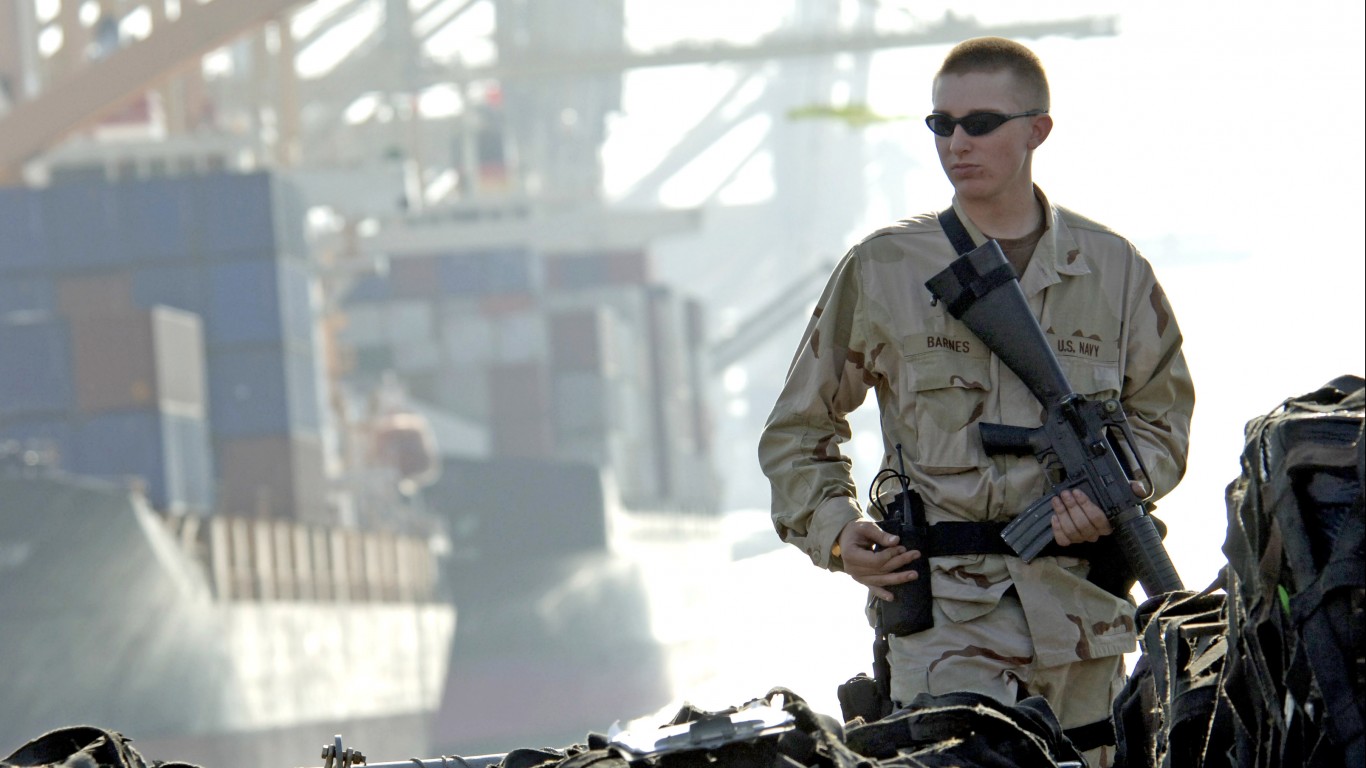
30. United Arab Emirates
> Number of installations: 1
> Size: 36 acres valued at $113.2 million
> Largest installation: Naval Support Activity Bahrain – Jebel Ali
> United Arab Emirates population: 9,400,145
> GDP per capita: $67,293
Dubai, known for soaring skyscrapers and jet-setters, is also home to Naval Station Activity Bahrain – Jebel Ali. Jebel Ali is the biggest port of call for the American naval fleet outside of the United States.
[in-text-ad]
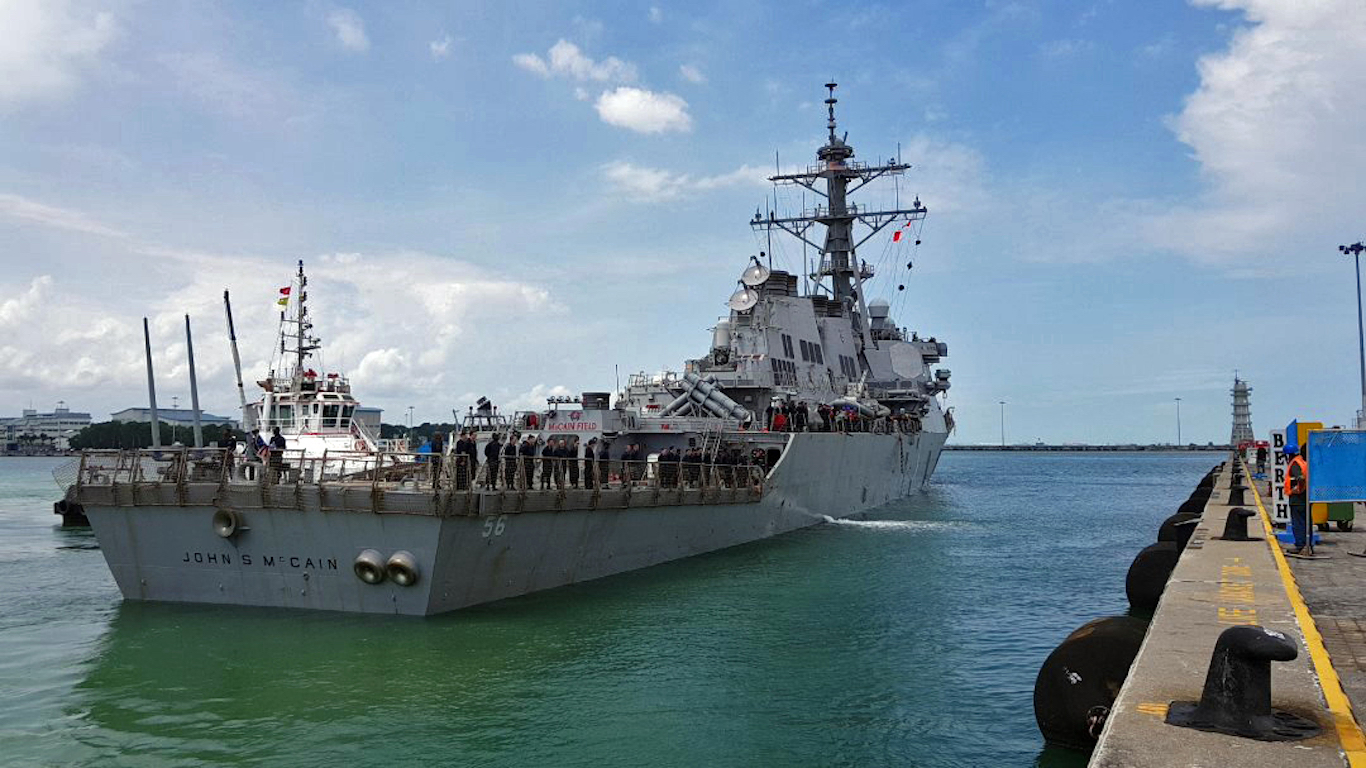
29. Singapore
> Number of installations: 1
> Size: N/A ($324.7 million)
> Largest installation: Singapore Area Coordinator
> Singapore population: 5,612,253
> GDP per capita: $85,535
The U.S. military’s presence in Singapore dates back to the 1960s and America’s involvement in the Vietnam War. The Singapore Area Coordinator was established in 2007 and provides support to members of all four military branches and their families.
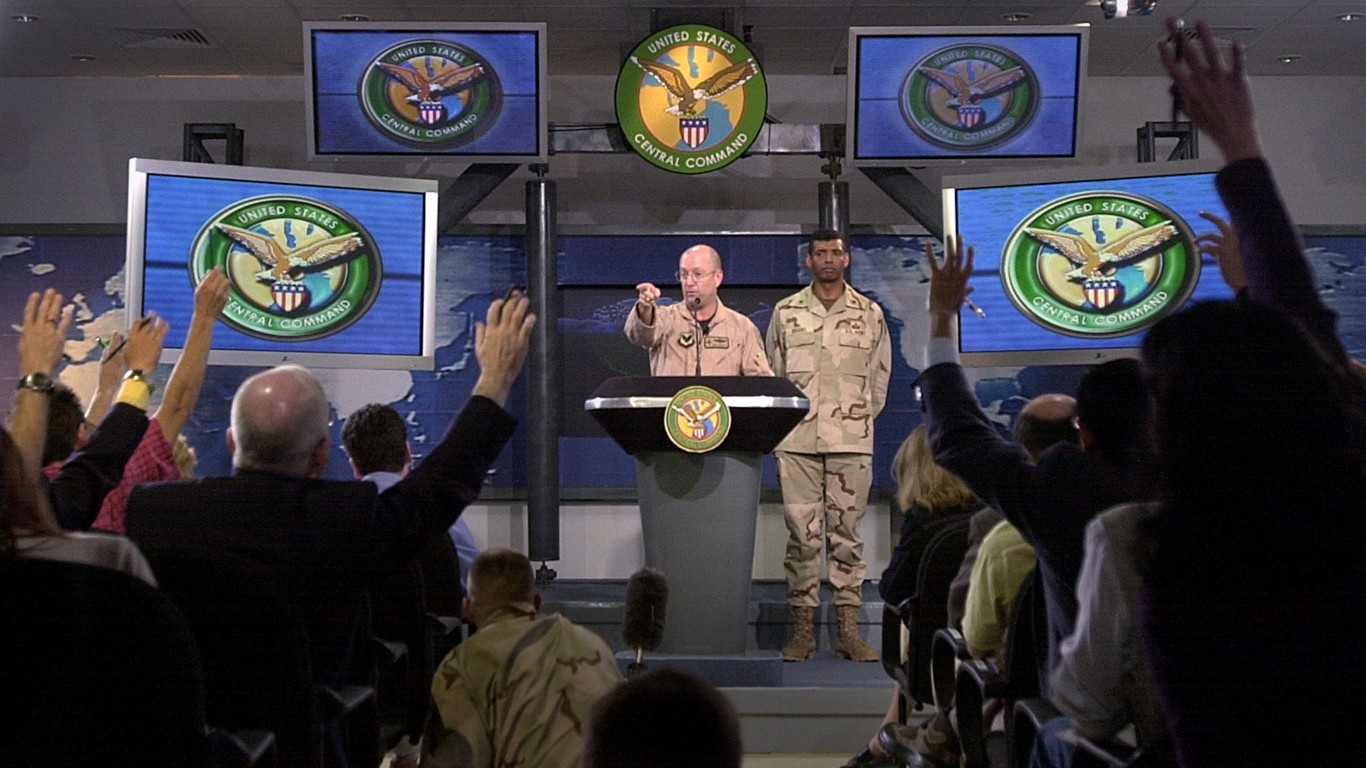
28. Qatar
> Number of installations: 1
> Size: N/A ($106.2 million)
> Largest installation: Camp As Sayliyah
> Qatar population: 2,639,211
> GDP per capita: $116,932
Camp As Sayliyah, or CAS, is located just outside of Qatar’s capital of Doha. The base was completed in 2000 at a cost of $110 million and hosts armor and support units that can be quickly deployed to respond to a regional crisis.
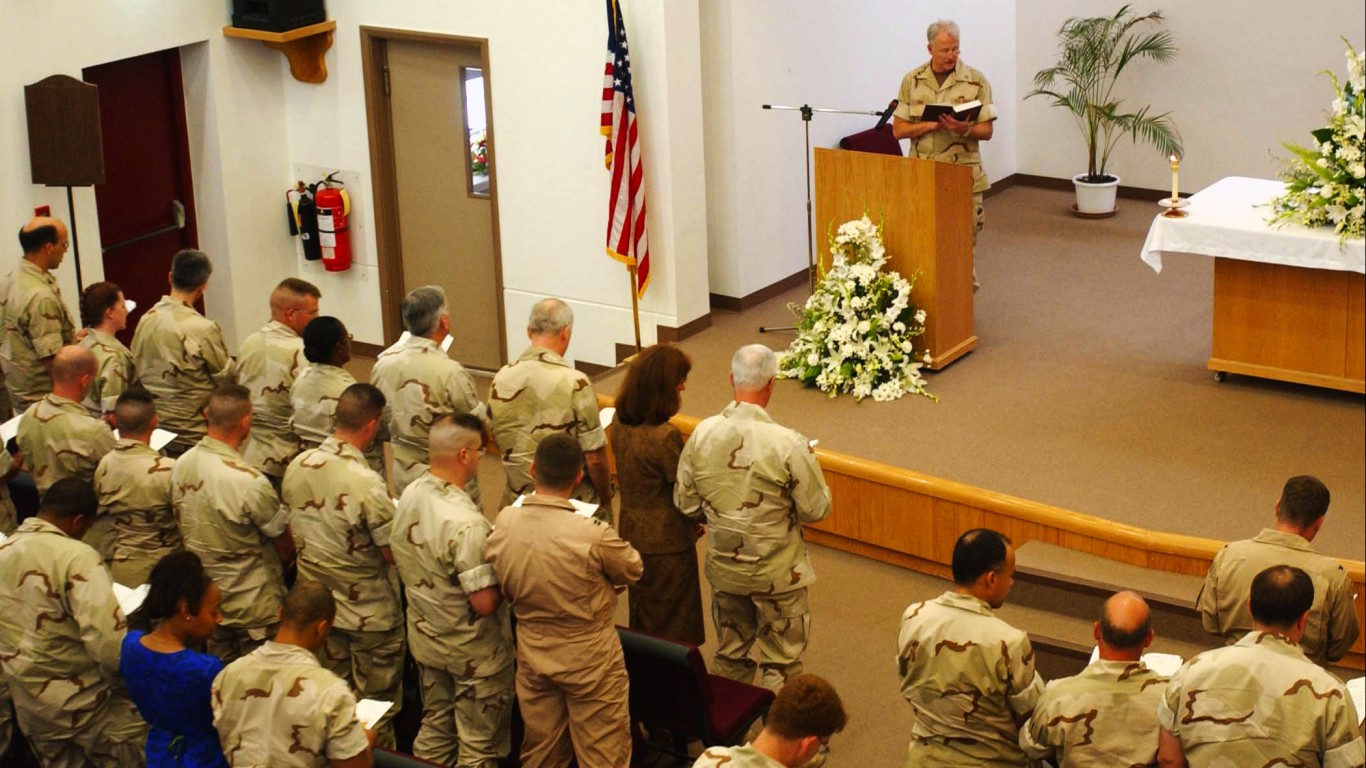
27. Kenya
> Number of installations: 1
> Size: N/A ($41.2 million)
> Largest installation: Naval Support Activity Bahrain – Kenya
> Kenya population: 49,699,862
> GDP per capita: $2,993
Kenya is part of one of three counter-terrorism theaters of operations for the United States in Africa. The Naval Support Activity Bahrain facility is located near the city of Mombasa in the southern part of the country on the Indian Ocean.
[in-text-ad-2]
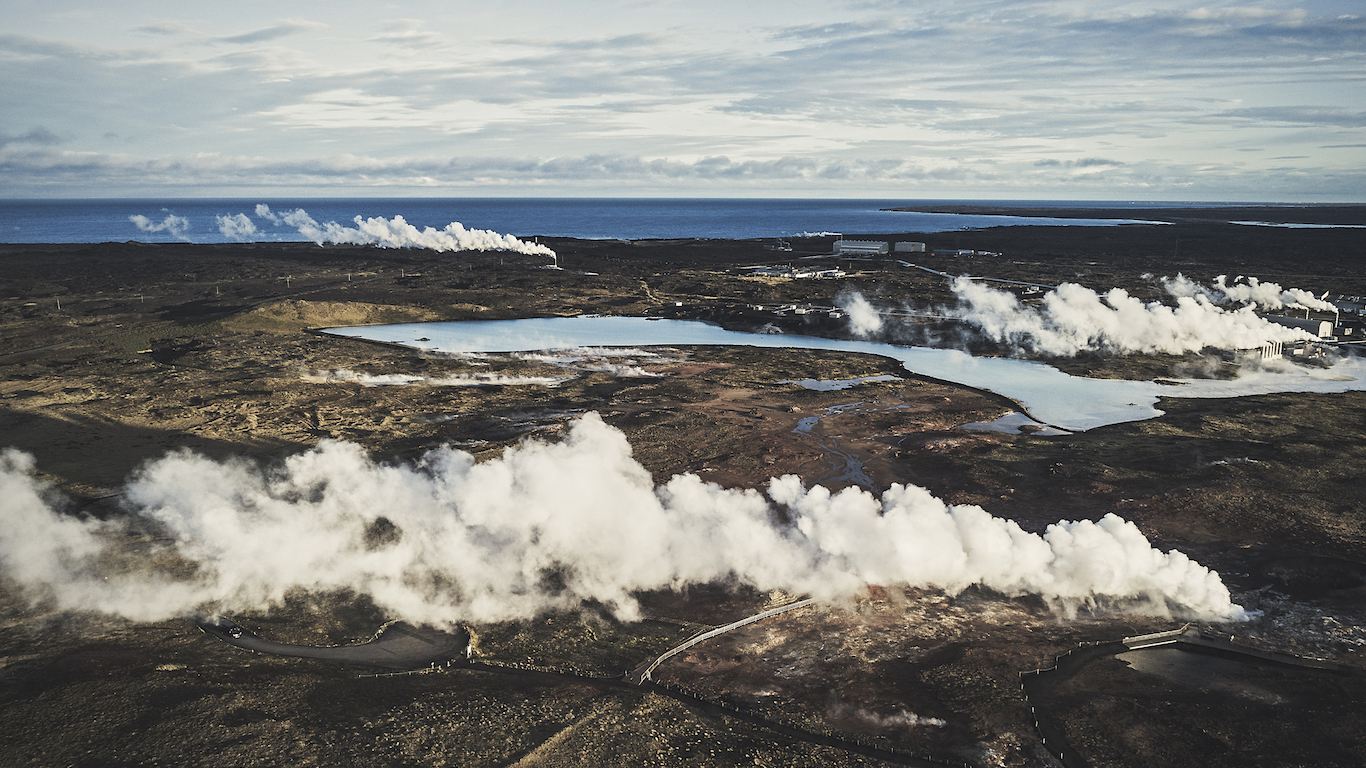
26. Iceland
> Number of installations: 1
> Size: 1,049 acres valued at $28.0 million
> Largest installation: Grindavik, Iceland
> Iceland population: 343,400
> GDP per capita: $47,575
The U.S. military presence in Iceland has declined in recent years. The fishing town of Grindavik hosts a U.S. Navy transmitter. Naval Air Station Keflavik, formerly the home to 5,000 troops, was deactivated in 2006, although the United States recently renovated a hangar there to service submarine-hunting aircraft.
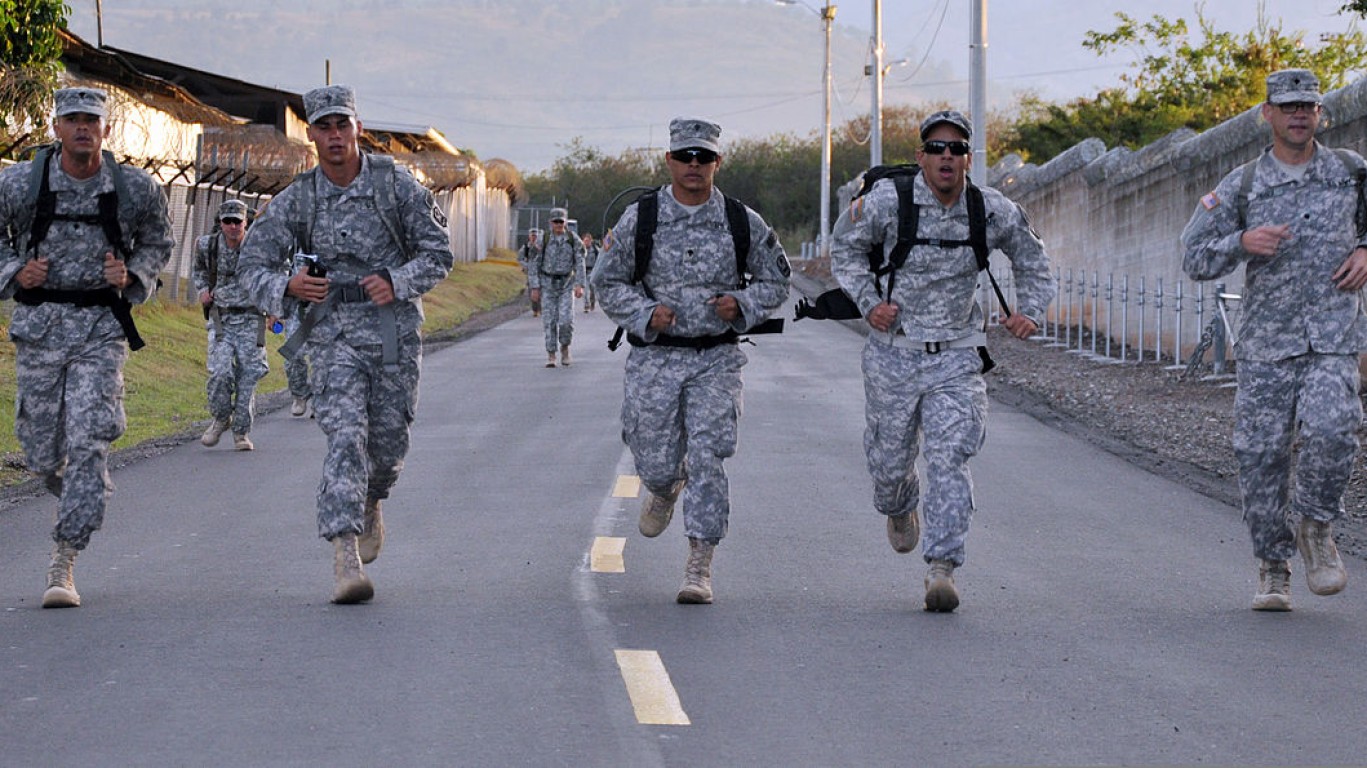
25. Honduras
> Number of installations: 1
> Size: N/A ($494.0 million)
> Largest installation: Soto Cano Air Base
> Honduras population: 9,265,067
> GDP per capita: $4,542
About 1,200 Americans work at Soto Cano Air Base in Honduras, half of them service members of Joint Task Force-Bravo, which has been a military presence in Central America since 1983. The base also hosts the Honduran Air Force Academy.
[in-text-ad]
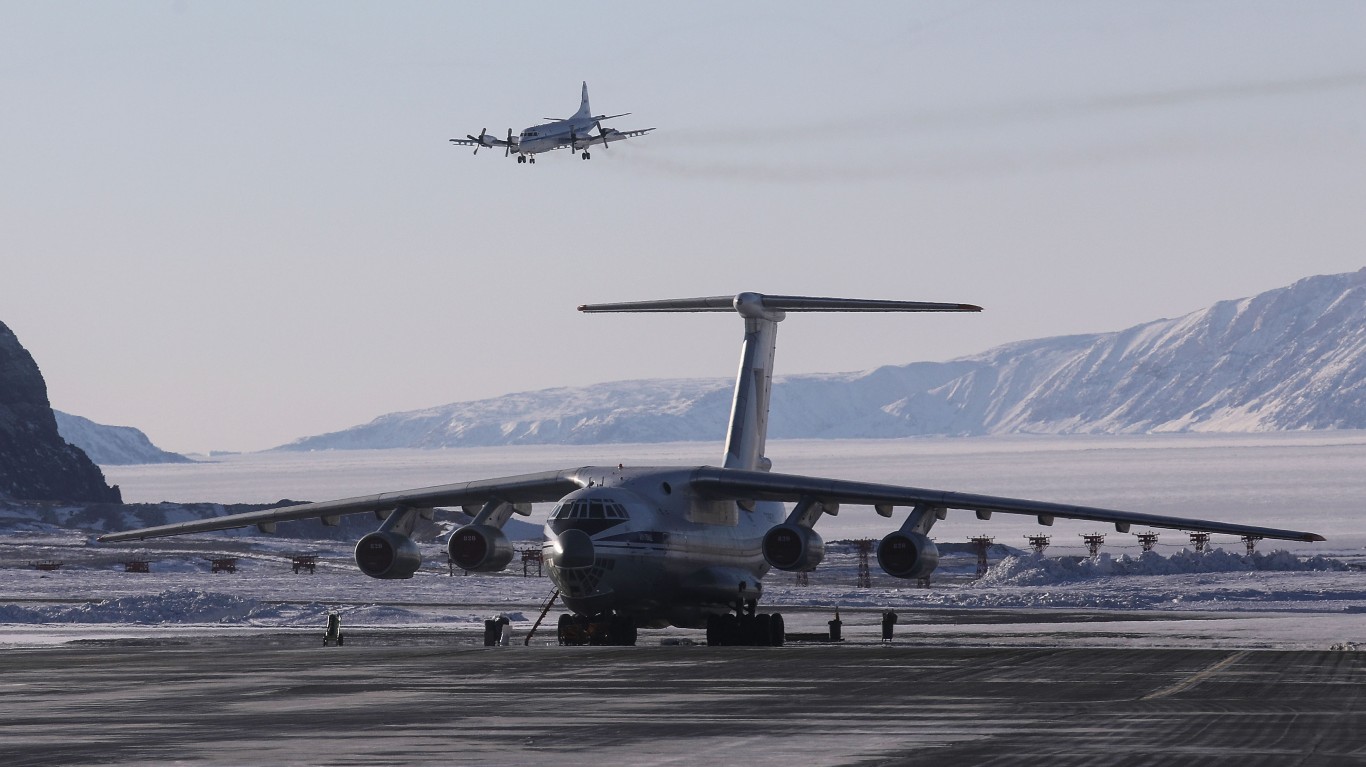
24. Greenland
> Number of installations: 1
> Size: 233,034 acres valued at $4.7 billion
> Largest installation: Thule Air Base
> Greenland population: 56,171
> GDP per capita: N/A
Thule Air Base in Greenland is by far the largest U.S. military base overseas by physical size. It is also the northernmost base of any U.S. installation, 750 miles from the Arctic Circle. Thule is the headquarters of the 821st Air Base Group.
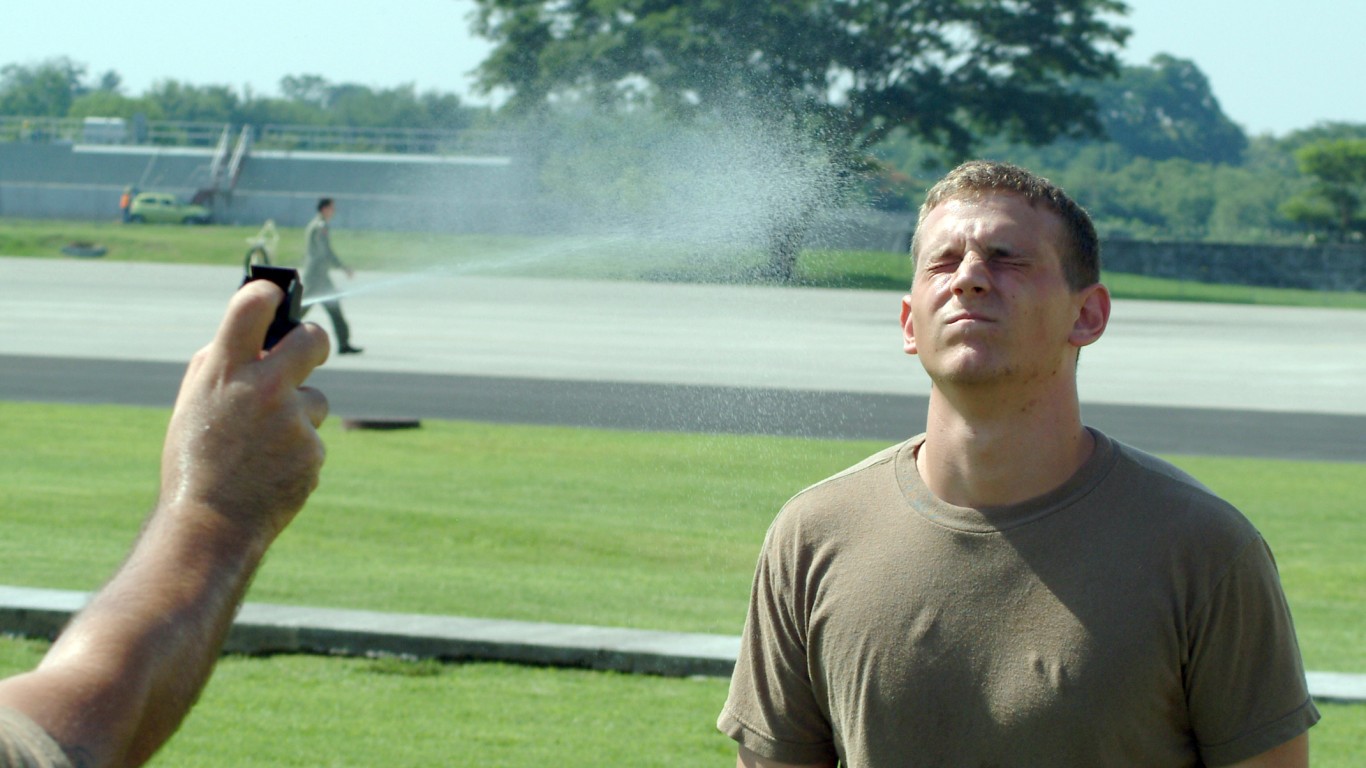
23. El Salvador
> Number of installations: 1
> Size: 35 acres valued at $24.2 million
> Largest installation: Cooperative Security Location El Salvador
> El Salvador population: 6,377,853
> GDP per capita: $7,292
The Cooperative Security Location in El Salvador facility opened in 2000 after the United States closed bases in Panama the year before. The installation in El Salvador was needed to patrol the eastern Pacific region and provide logistical support to aviation units tasked with combating illicit activities in the region. Activity at the El Salvador base has increased since the United States shuttered military base operations in Ecuador in 2009.
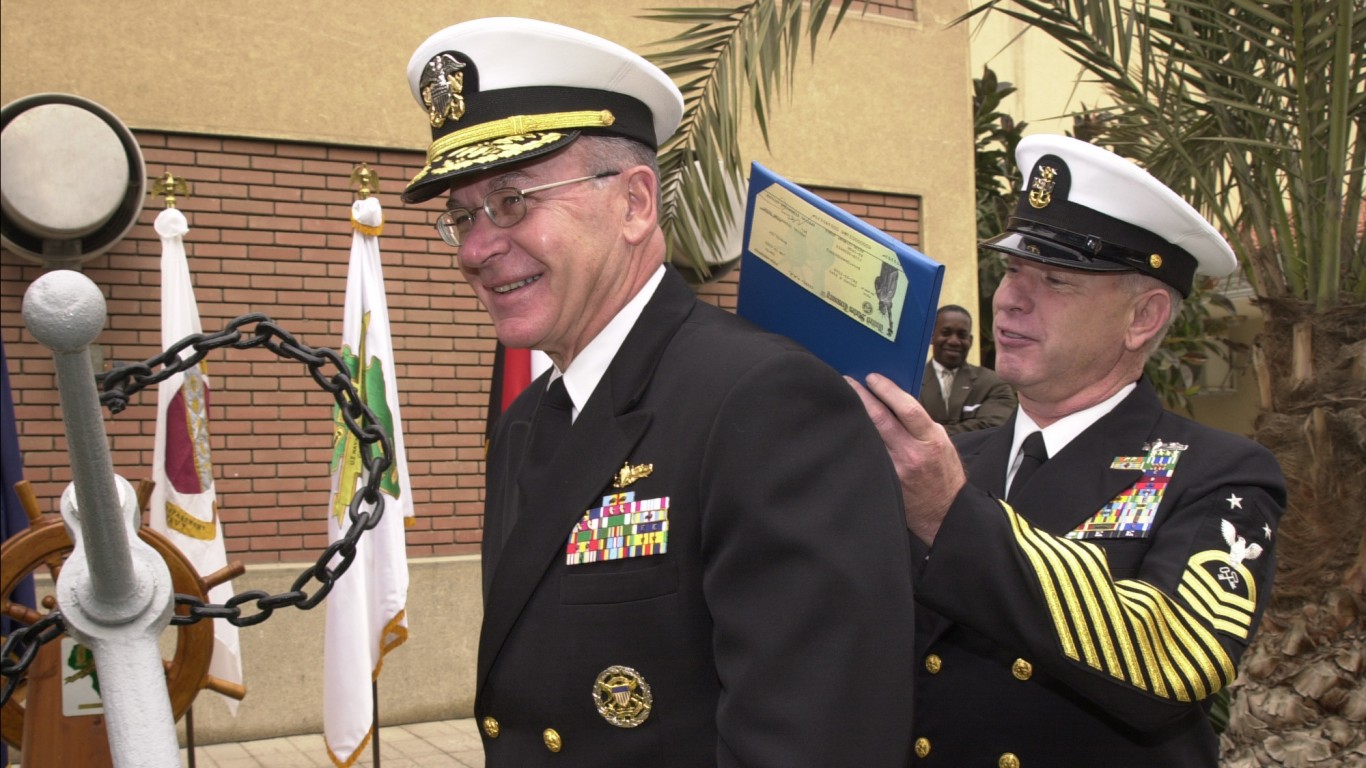
22. Egypt
> Number of installations: 1
> Size: 3 acres valued at $68.4 million
> Largest installation: Naval Medical Research Unit 3
> Egypt population: 97,553,151
> GDP per capita: $10,551
Naval Medical Research Unit 3 operates out of Egypt’s capital of Cairo. The unit dates back to the 1940s, when President Franklin Roosevelt established the Typhus Commission to combat typhus, a disease that was ravaging American troops and civilians in North Africa during World War II. The Cairo office worked with British and Egyptian medical experts to fight the disease. The Navy established the research unit in 1946 and still works in Egypt today.
[in-text-ad-2]
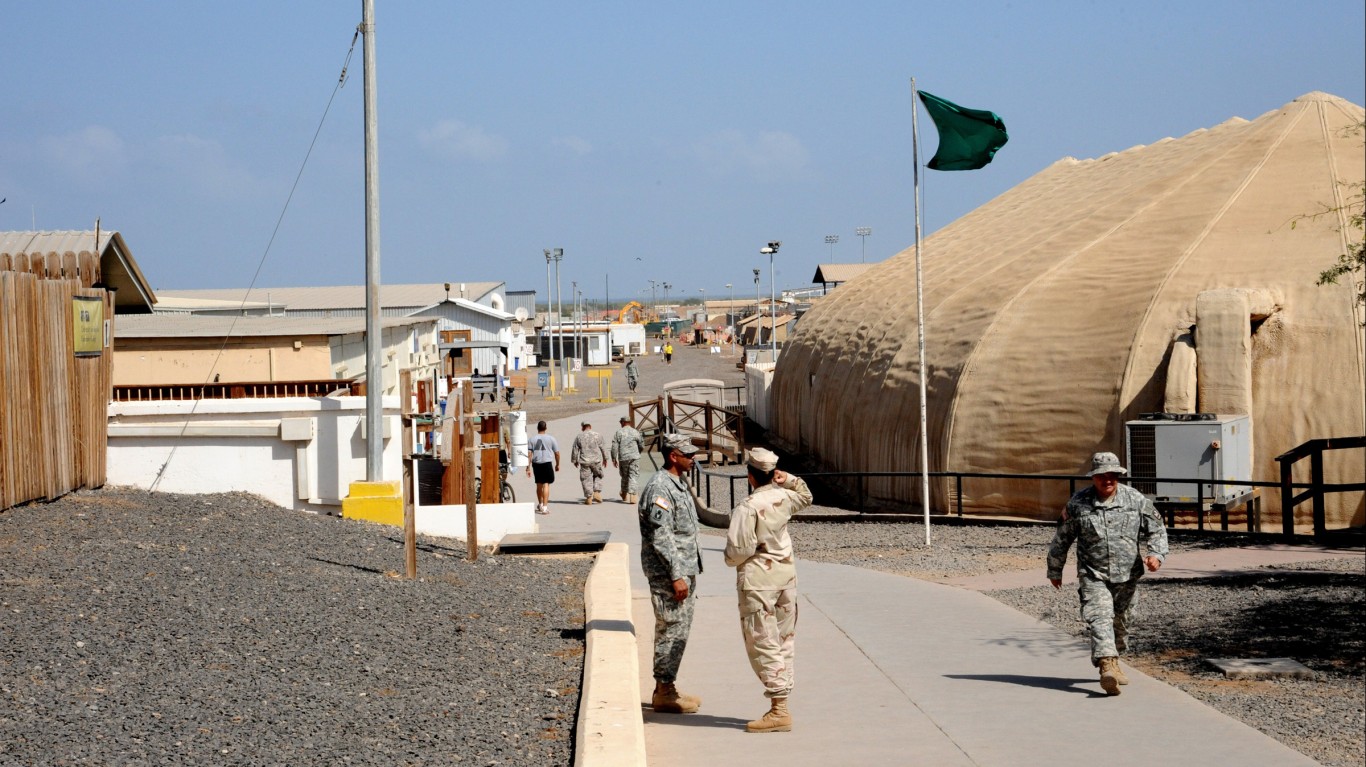
21. Djibouti
> Number of installations: 1
> Size: 572 acres valued at $1.2 billion
> Largest installation: Camp Lemonier Djibouti
> Djibouti population: 956,985
> GDP per capita: $2,705
Because of its strategic location on the Red Sea between Africa and Asia, Djibouti is host to military bases of several countries, including the United States. The American base is Camp Lemonnier, and it is the largest U.S. permanent military base in Africa. The base hosts more than 4,000 personnel, many of whom are part of the Combined Joint Task Force – Horn of Africa.
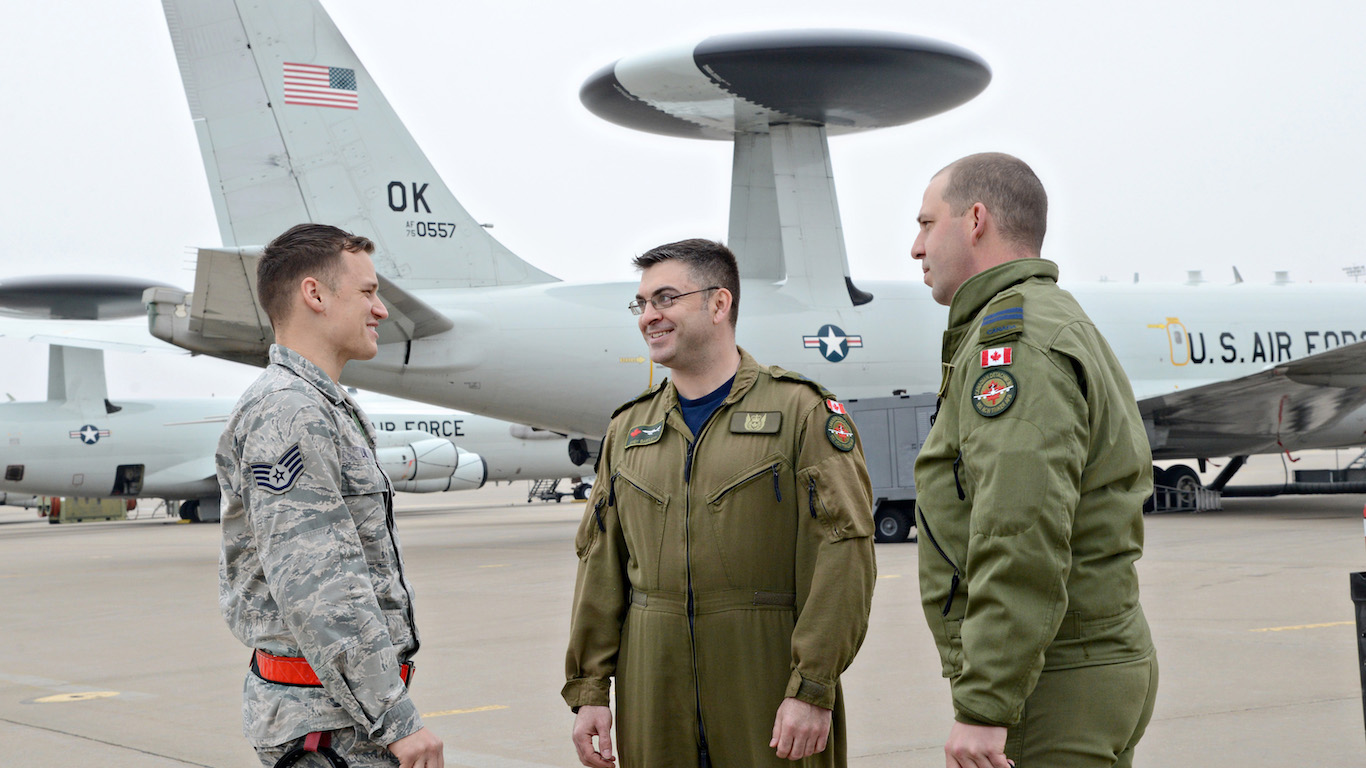
20. Canada
> Number of installations: 1
> Size: 185 acres (value not available)
> Largest installation: Argentia Newfoundland
> Canada population: 36,708,083
> GDP per capita: $44,018
The United States gained the military base Argentia Newfoundland as part of the Leased Bases Agreement with Great Britain in 1941 in exchange for 50 aging American destroyers. The United States still retains the base in the Canadian province of Newfoundland under a 99-year lease agreement. Other American bases in Canada closed after the war, but Argentia continued to operate as a U.S. naval facility until 1994, when the last remaining American military service members left the base. It remains on the books as U.S. base.
[in-text-ad]
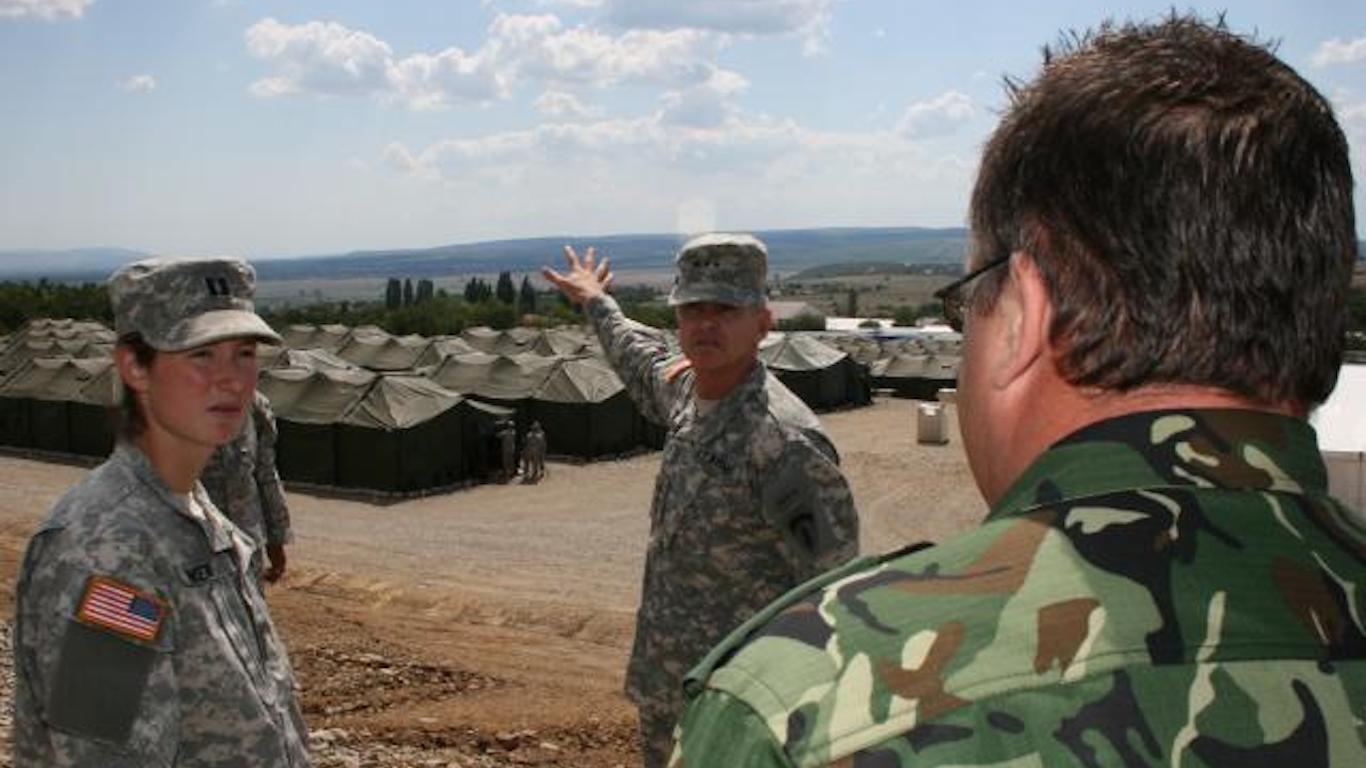
19. Bulgaria
> Number of installations: 1
> Size: N/A ($137.9 million)
> Largest installation: Novo Selo Training Area
> Bulgaria population: 7,075,947
> GDP per capita: $18,606
The Novo Selo Training Area is a joint U.S.-Bulgarian military base at Novo Selo in the eastern section of the Balkan country. The American presence has grown in the nations that have joined NATO since 2016, in response to Russia’s annexation of Crimea and aggression in Ukraine. Bulgaria, a former member of the Warsaw Pact, has been a NATO member since 2004. In 2006, the country signed a defense cooperation agreement with the United States.
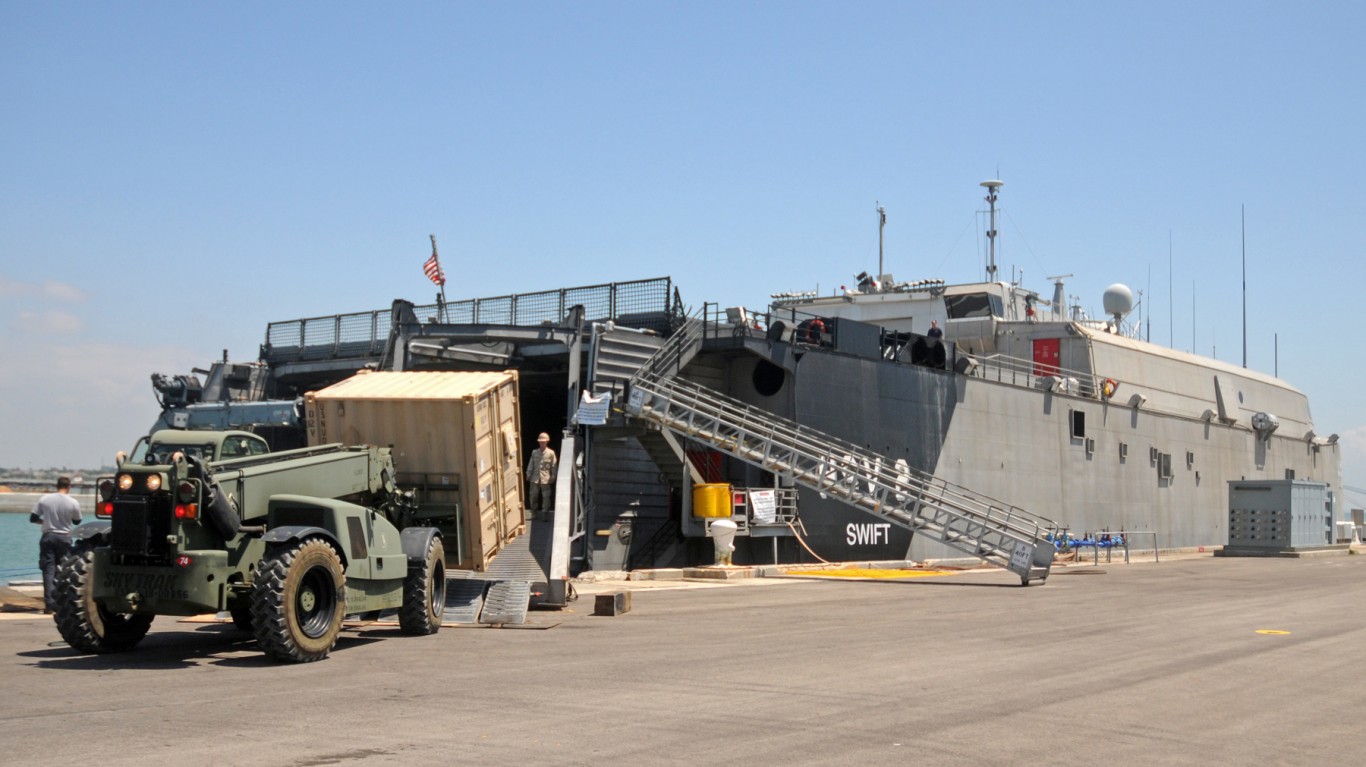
18. Spain
> Number of installations: 2
> Size: 9,390 acres valued at $2.8 billion
> Largest installation: Naval Station Rota
> Spain population: 46,593,171
> GDP per capita: $34,269
One of two bases with U.S. military presence in Spain, Naval Station Rota is located in the southern part of the country and was established in 1953. It provides logistical support and serves as a strategic presence in the eastern Mediterranean Sea for the U.S. Navy. It supports U.S. naval forces in Europe and Africa, including the 6th Fleet, at a nearly 6,000-acre facility. .
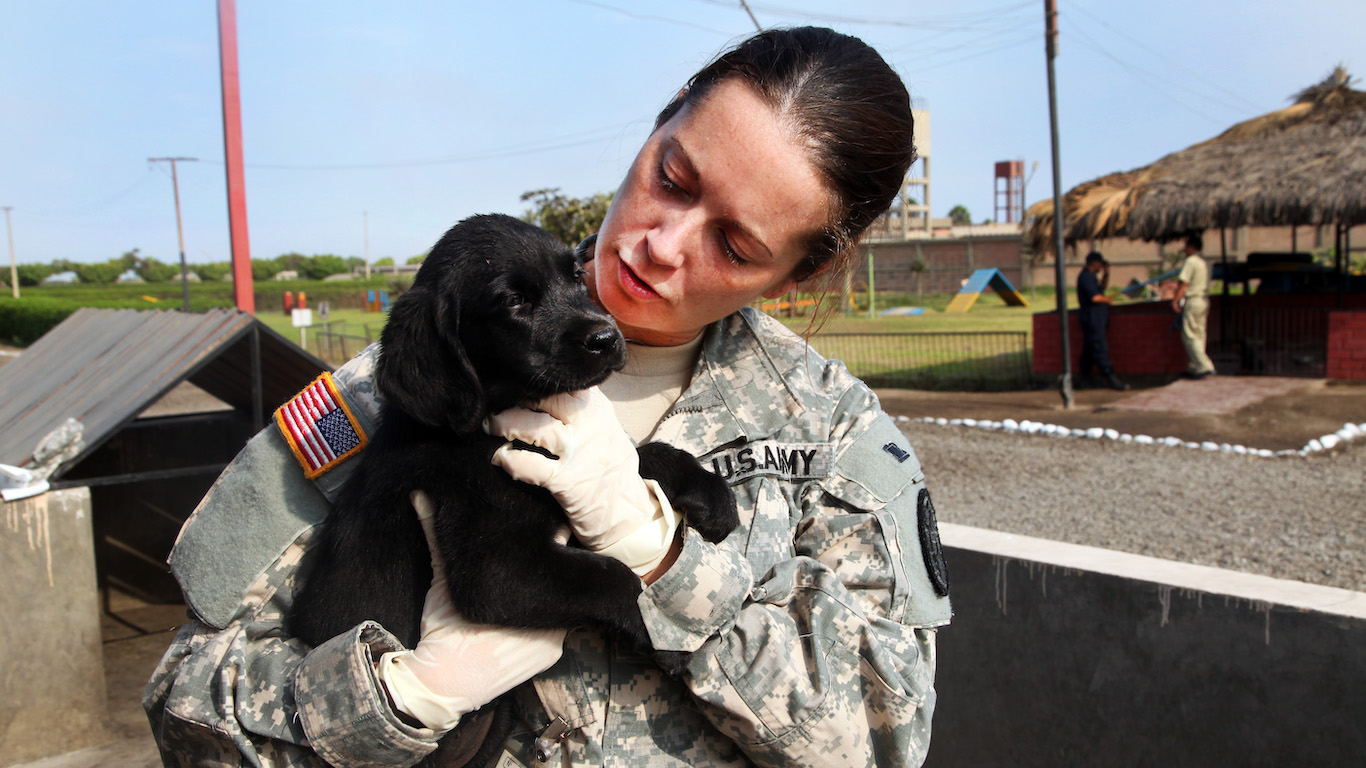
17. Peru
> Number of installations: 2
> Size: N/A ($19.8 million)
> Largest installation: Naval Medical Research Unit 6
> Peru population: 32,165,485
> GDP per capita: $12,237
Naval Medical Research Unit 6, one of two bases with U.S. military presence in Peru, is located in the Peruvian capital of Lima since 1983. The unit conducts research on infectious diseases such as malaria and yellow fever that pose a threat to American military assets in that region of South America.
[in-text-ad-2]

16. Kuwait
> Number of installations: 2
> Size: N/A ($1.2 billion)
> Largest installation: Camp Arifjan
> Kuwait population: 4,136,528
> GDP per capita: $65,531
Camp Arifjan in Kuwait is primarily a U.S. Army base in Kuwait, though Air Force, Navy, and Marine personnel also use its facilities. It is a forward-deployment camp, meaning that troops going to or leaving from strategically important countries like Iraq pass through Camp Arifjan. The country hosts the U.S. military in one other base near the city of Udairi.
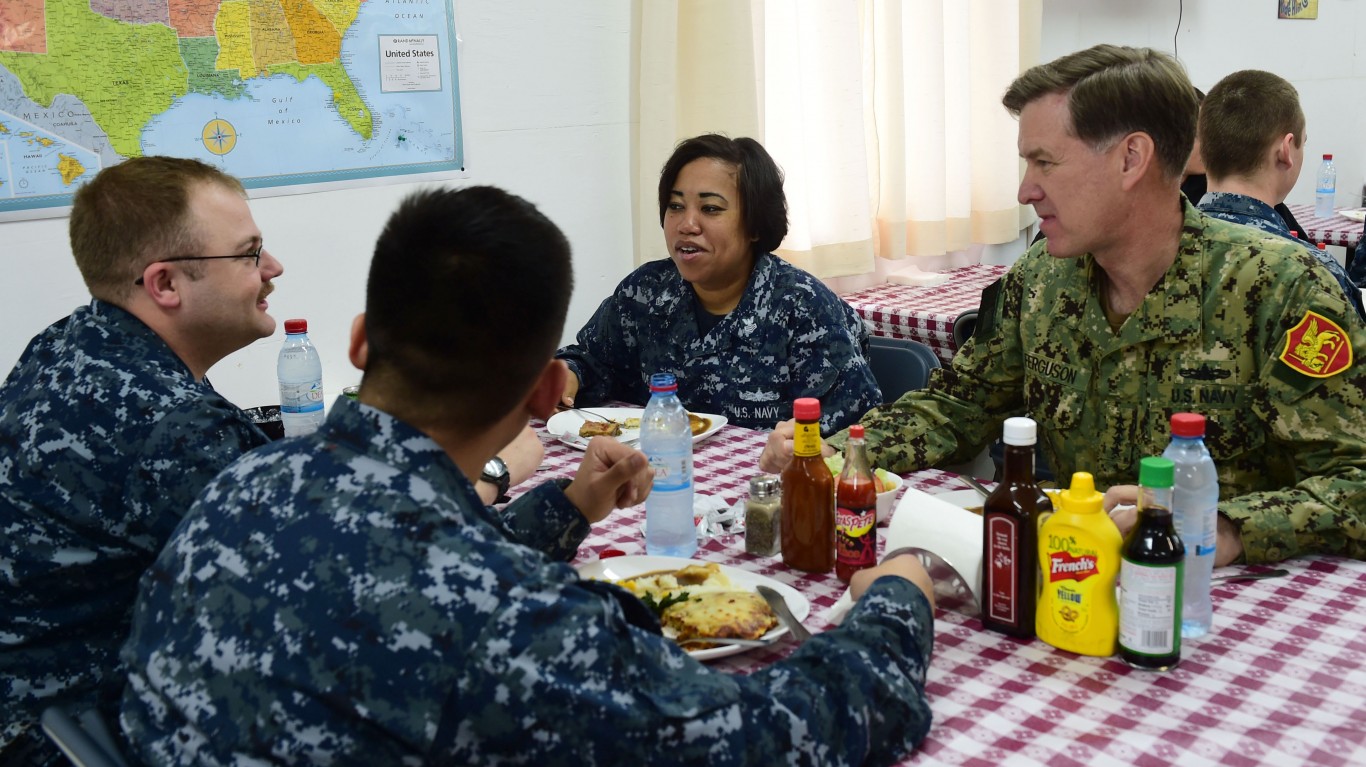
15. Romania
> Number of installations: 3
> Size: 438 acres valued at $187.3 million
> Largest installation: Naval Support Facility Deveselu
> Romania population: 19,583,986
> GDP per capita: $23,505
Naval Support Facility Deveselu in Romania is where the Aegis Ashore Missile Defense Facility is deployed, supporting NATO’s ballistic missile defense system. The system is designed to intercept cruise missiles and aircraft. Naval Support Facility Deveselu is one of three U.S. military facilities in Romania, a NATO member since 2004. The United States is modernizing its facilities in Romania and neighboring Bulgaria.
[in-text-ad]
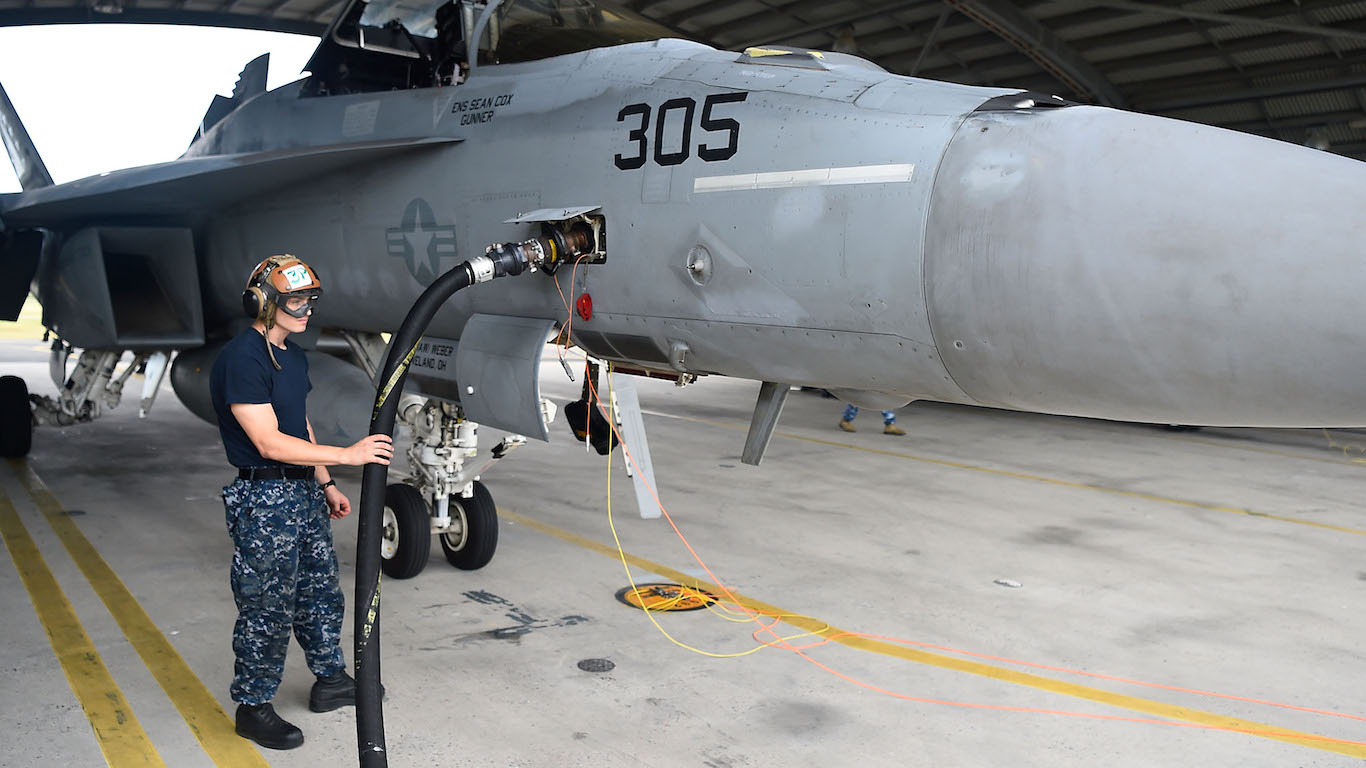
14. Australia
> Number of installations: 3
> Size: 20,077 acres valued at $270.3 million
> Largest installation: Area C-HFR
> Australia population: 24,601,860
> GDP per capita: $44,643
The U.S. Navy jointly operates communications facilities, called Area C-HFR (high frequency receiver), and other military bases with Australian forces in western Australia, in an area comprising three sites about 37 miles apart on a peninsula that separates the Exmouth Gulf from the Indian Ocean. The communications installation was set up to communicate with submarines and surface vessels in the Indian and western Pacific oceans.
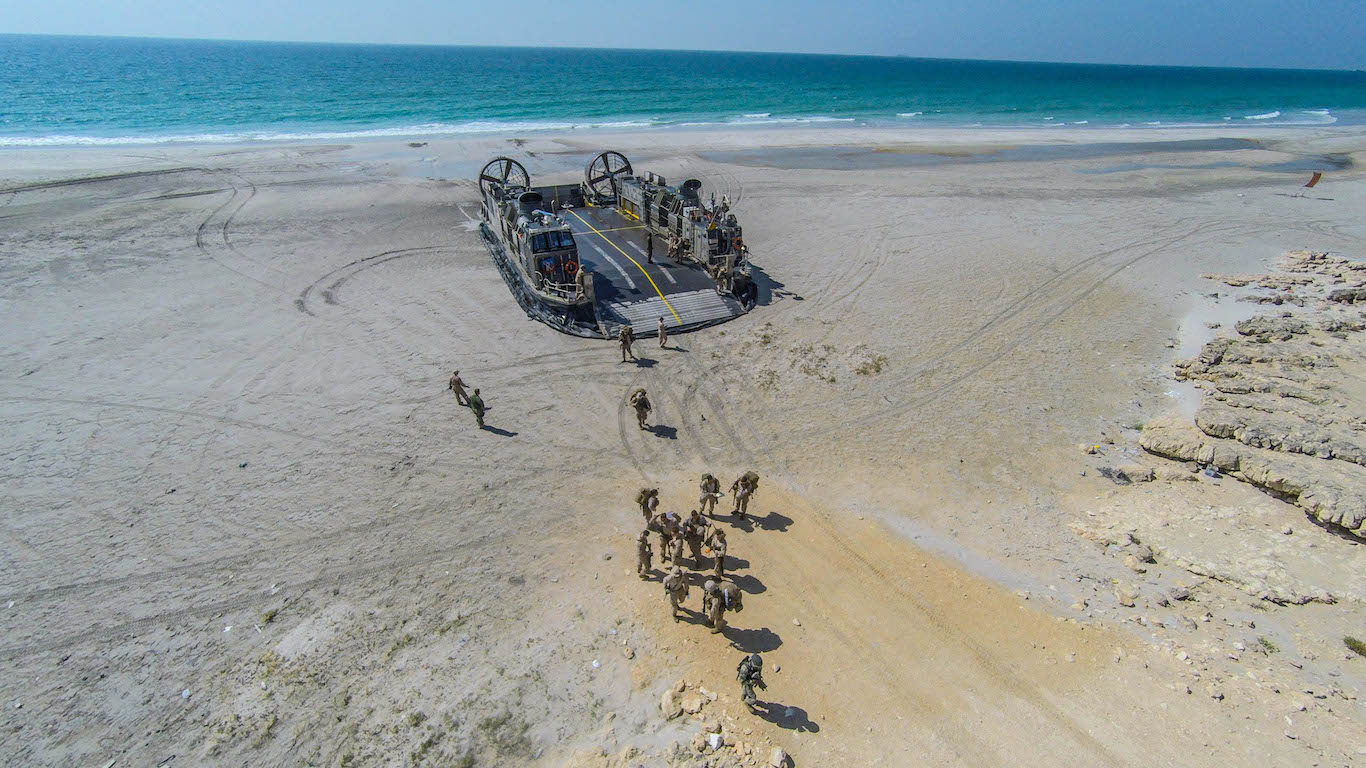
13. Oman
> Number of installations: 4
> Size: 9,000 acres valued at $186.2 million
> Largest installation: Seeb MPT Site
> Oman population: 4,636,262
> GDP per capita: $37,567
Oman and the United States have had diplomatic relations for nearly 200 years. Those relations were deepened in 1981, when the sultanate signed an access agreement with the United States. Seeb is one of the three U.S. air bases located in the Middle Eastern country. It is a transportation and logistics hub near the international airport. The U.S. Navy also operates a facility on Masirah Island in Oman.
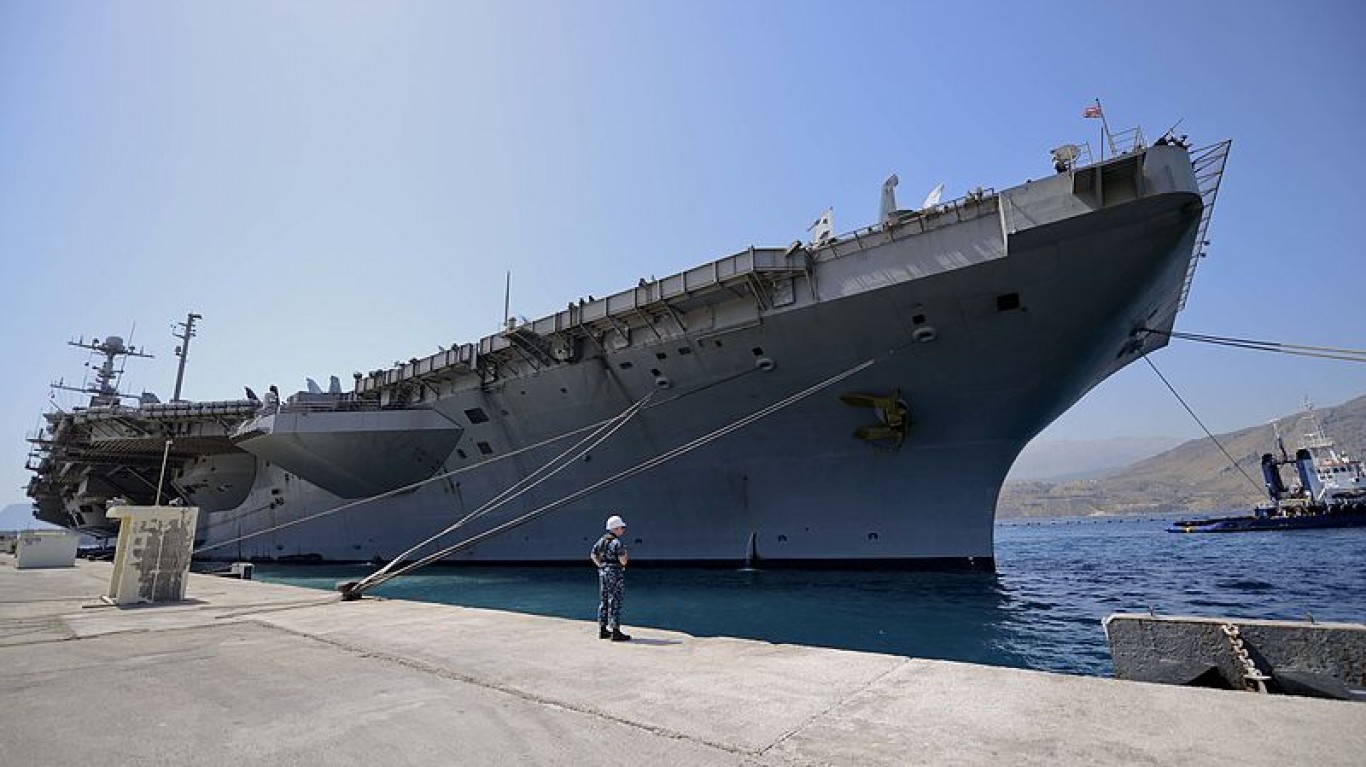
12. Greece
> Number of installations: 4
> Size: 101 acres valued at $545.5 million
> Largest installation: Naval Support Activity Souda Bay
> Greece population: 10,753,531
> GDP per capita: $24,604
The Naval Support Activity Souda Bay is located on the northwest coast of the Greek island of Crete, in the Mediterranean Sea. The installation, one of four in Greece, provides services focused on combat readiness for ships, aircraft, and personnel. The U.S. Navy’s Souda Bay facility is also home to the Hellenic Air Force’s 115th Combat Wing.
[in-text-ad-2]
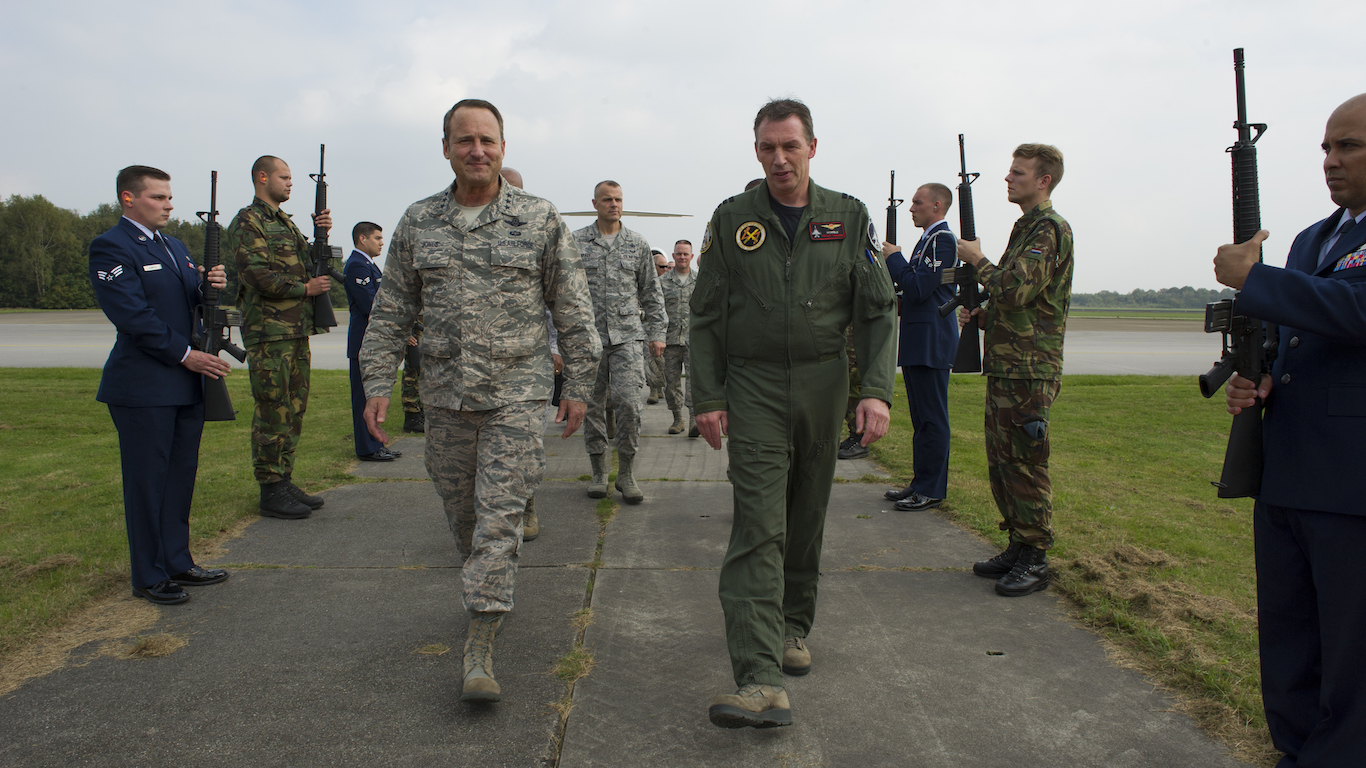
11. Netherlands
> Number of installations: 5
> Size: N/A ($526.6 million)
> Largest installation: Hendrik Mine in Brunssum
> Netherlands population: 17,131,296
> GDP per capita: $48,789
The Allied Joint Force Command Brunssum, or HQ JFC Brunssum, was established in 1967 in the southern part of the Netherlands near Limburg. Its predecessor, HQ AFCENT (Headquarters Allied Forces Central Europe), had been located in Fontainebleau in France, but had to leave its headquarters after France withdrew from NATO’s integrated military command in 1966. At that time, coal mines closed in Limburg, the Netherlands offered the Henrik Mine infrastructure for NATO use. There are four other bases with U.S. military operations in the Netherlands.
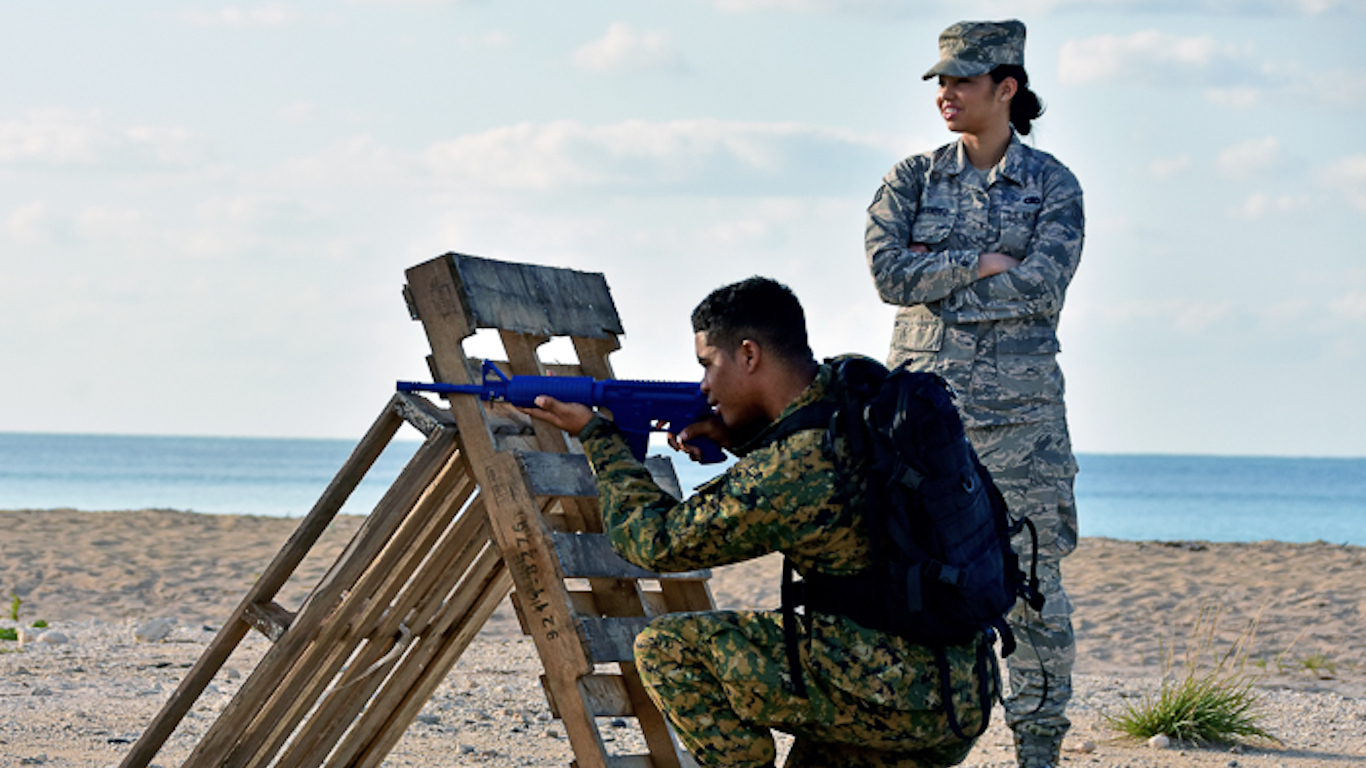
10. Bahamas
> Number of installations: 6
> Size: 541 acres valued at $460.1 million
> Largest installation: AUTEC Main Base
> Bahamas population: 395,361
> GDP per capita: $27,718
AUTEC, or Atlantic Undersea Test and Evaluation Center, is a U.S. Navy facility on Andros Island in the Bahamas. Andros is the largest island in the Bahamian archipelago. At AUTEC, the Navy conducts underwater testing and provides support of NATO weapon systems. The facility opened in 1966, when the Bahamas were still under the control of Great Britain. At the time, the United States needed an area that could simulate open-ocean conditions to test weapon systems and anti-submarine warfare detection systems. The nation hosts five other U.S. installations.
[in-text-ad]
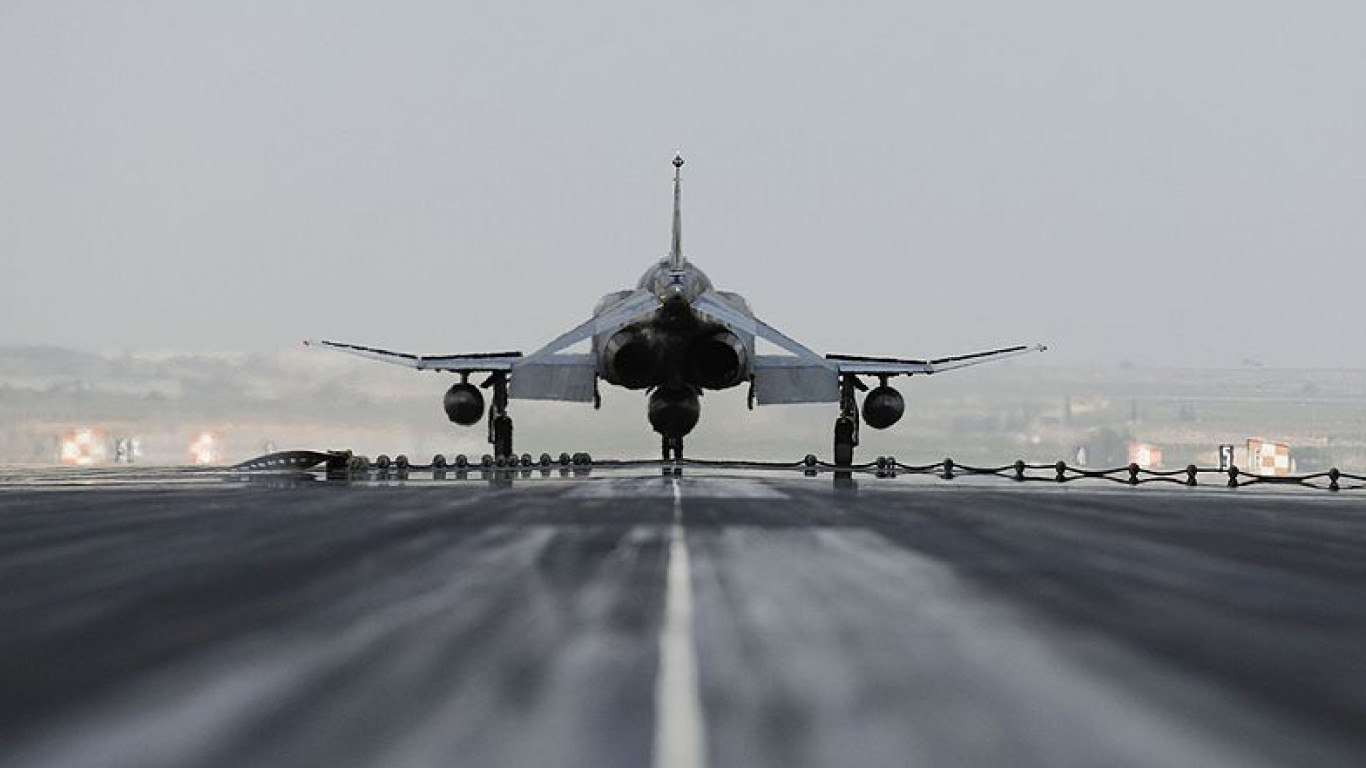
9. Turkey
> Number of installations: 9
> Size: 3,493 acres valued at $2.7 billion
> Largest installation: Incirlik Air Base
> Turkey population: 80,745,020
> GDP per capita: $25,135
Incirlik Air Base in Turkey, one of nine bases with U.S. military installations in that nation, was originally conceived during World War II, when Allied leaders agreed to build an air base south of Turkey’s capital of Ankara. The massive base opened in the 1950s, after Turkey formally joined NATO in 1952, and the facility was crucial in countering the Soviet threat in the Middle East. From Incirlik, the United States and its allies launched air strikes against Iraq during the first Gulf War and supported the attack on Iraq during Operation Iraqi Freedom in 2003.
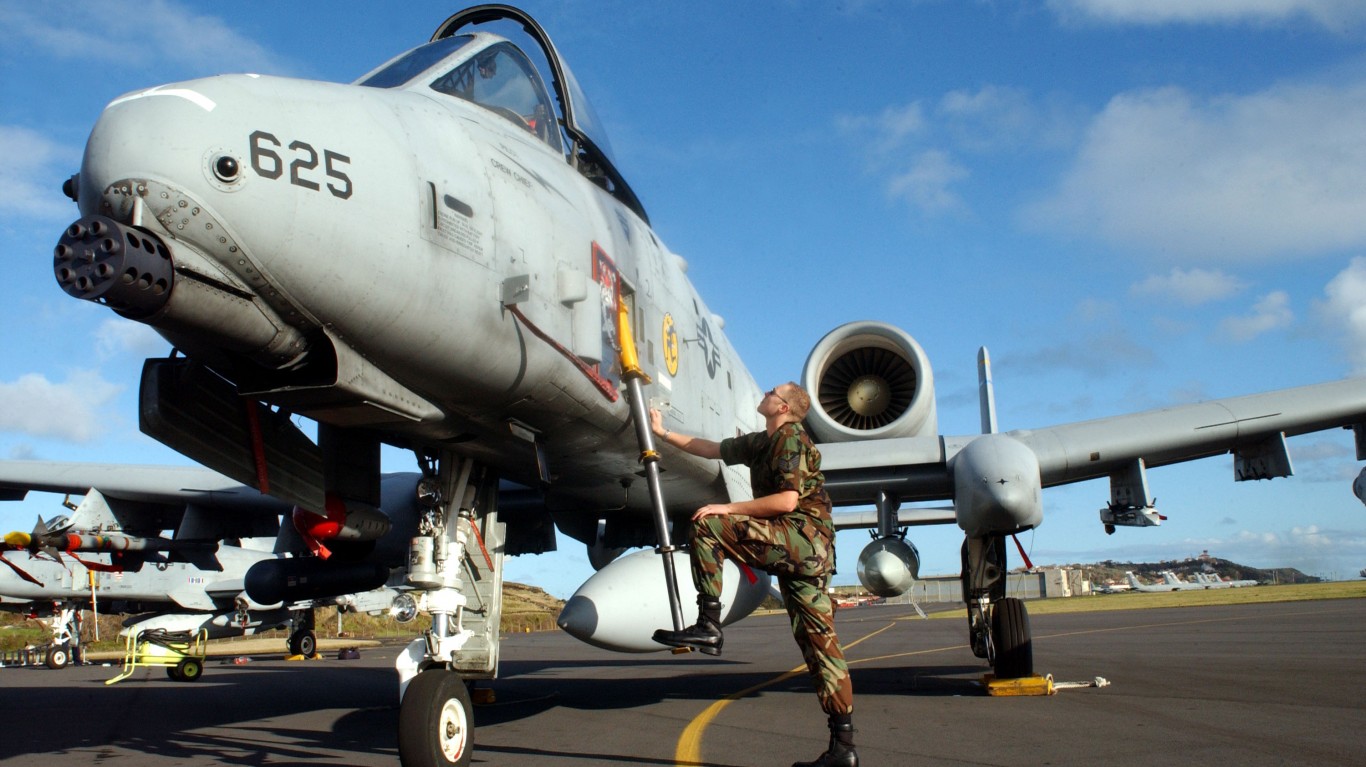
8. Portugal
> Number of installations: 9
> Size: 1,445 acres valued at $1.8 billion
> Largest installation: Lajes Field
> Portugal population: 10,300,300
> GDP per capita: $28,035
The United States has a strong military presence in Portugal, with nine bases in total. A key installation is Lajes Field, located on the island of Terceira in the Azores, where the 65th Air Base Wing is stationed. Lajes Field is known as the “Crossroads of the Atlantic” — a mid-Atlantic link between the United States and its allies to Europe, Africa, and the Middle East. The facility was built during World War II because its location reduced flying time for Allied planes. Portugal joined NATO in 1949, and Lajes Field continued to serve the United States and its allies during the Cold War.
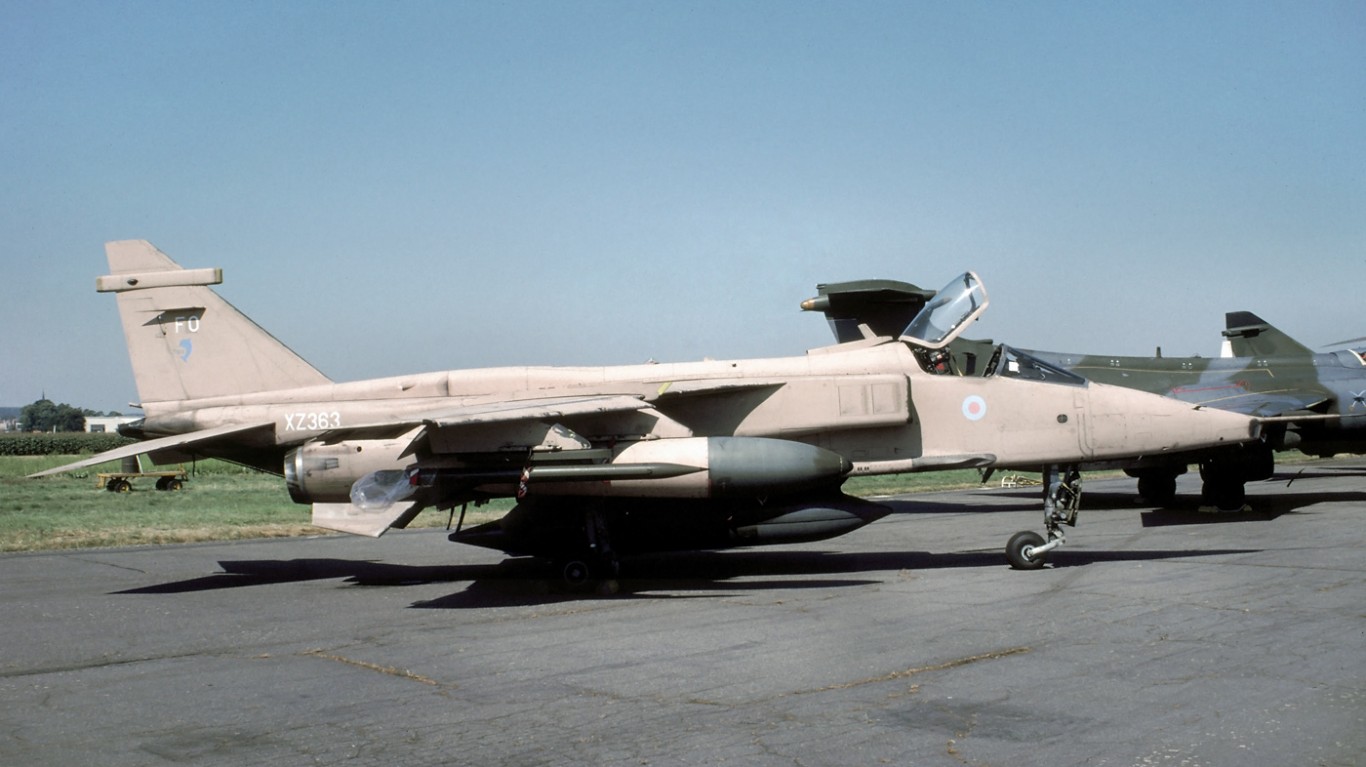
7. Belgium
> Number of installations: 9
> Size: N/A ($1.5 billion)
> Largest installation:Chievres Air Base
> Belgium population: 11,382,393
> GDP per capita: $42,742
The Chievres Air Base in Belgium, one of nine military bases with U.S. operations in the country, has been operated by the NATO Supreme Headquarters Allied Powers Europe (SHAPE) Support Group since 1968. The facility provides logistical and aircraft transportation services to NATO and SHAPE. The air base has a long history. The German Empire in World War I started construction of the base in 1917, and when Nazi Germany invaded Belgium in 1940, the base returned to German hands. The retreating Germans destroyed the base in 1944, and American engineers rebuilt it.
[in-text-ad-2]
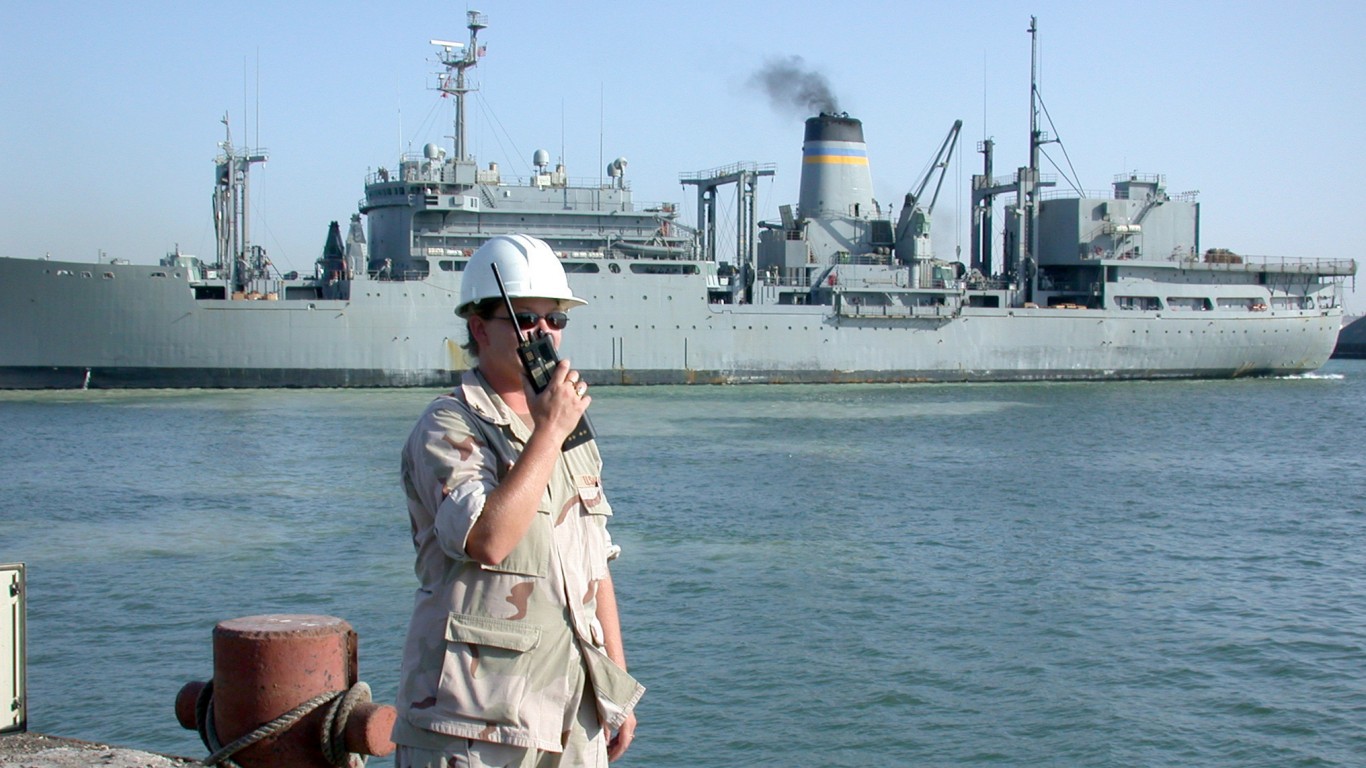
6. Bahrain
> Number of installations: 10
> Size: 204 acres valued at $1.5 billion
> Largest installation: Naval Support Activity-li
> Bahrain population: 1,492,584
> GDP per capita: $43,364
Naval Support Activity Bahrain, one of 10 U.S. military installations in the country, is located in the island country in the Persian Gulf which is home to the U.S. 5th Fleet. NSA Bahrain provides support to U.S. and allied forces in the region. There are 7,000 U.S. military personnel based in the kingdom, and the Navy has been there since 1948. The U.S. military operates in Bahrain by way of a Defense Cooperation Agreement signed in 1991.
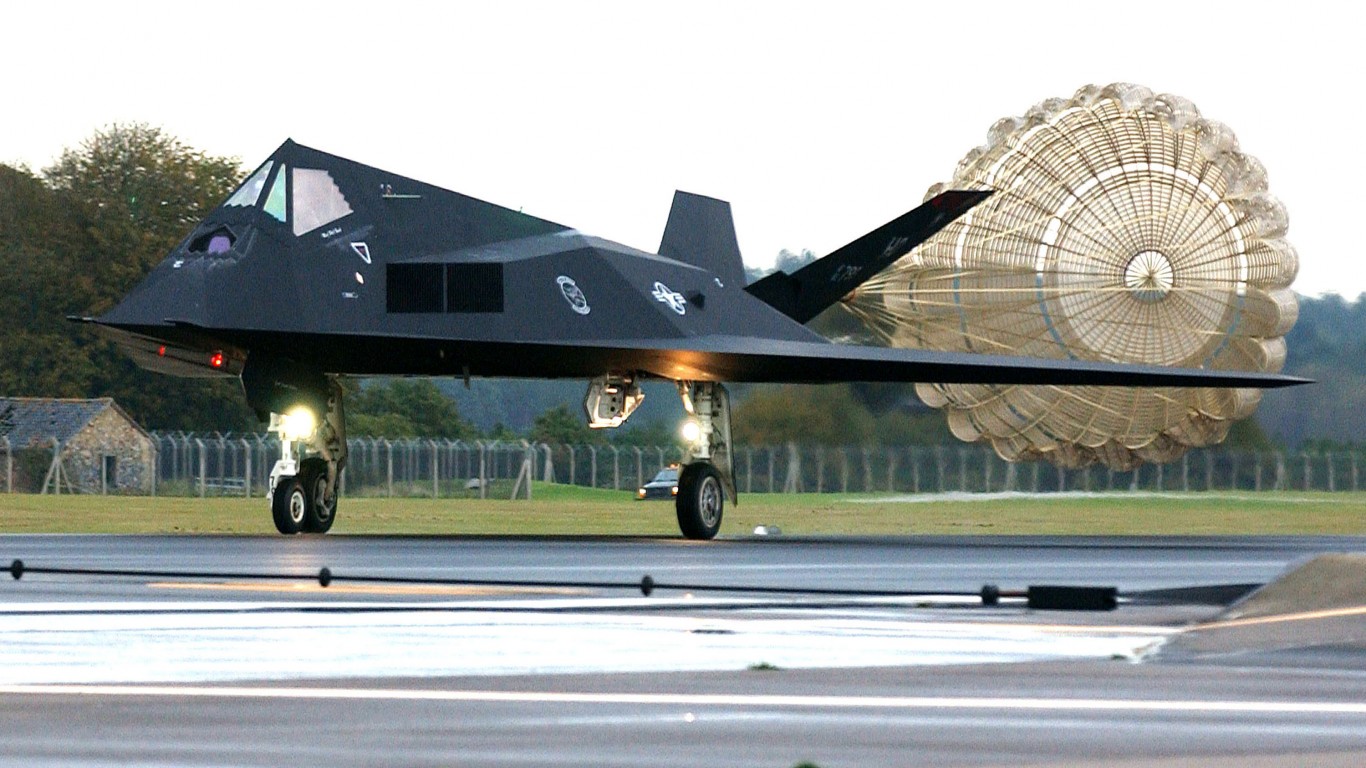
5. United Kingdom
> Number of installations: 16
> Size: 8,001 acres valued at $7.9 billion
> Largest installation: RAF Lakenheath
> United Kingdom population: 66,023,290
> GDP per capita: $39,884
One of America’s oldest allies also hosts 16 installations where the U.S. military is present. The biggest is RAF Lakenheath, located in Suffolk in the eastern region of England. The base traces its roots to World War I. It was abandoned once the war was over, but as the threat of Nazi invasion rose in 1940, the facility was made operational again. It was used for operations during the Cold War.
[in-text-ad]
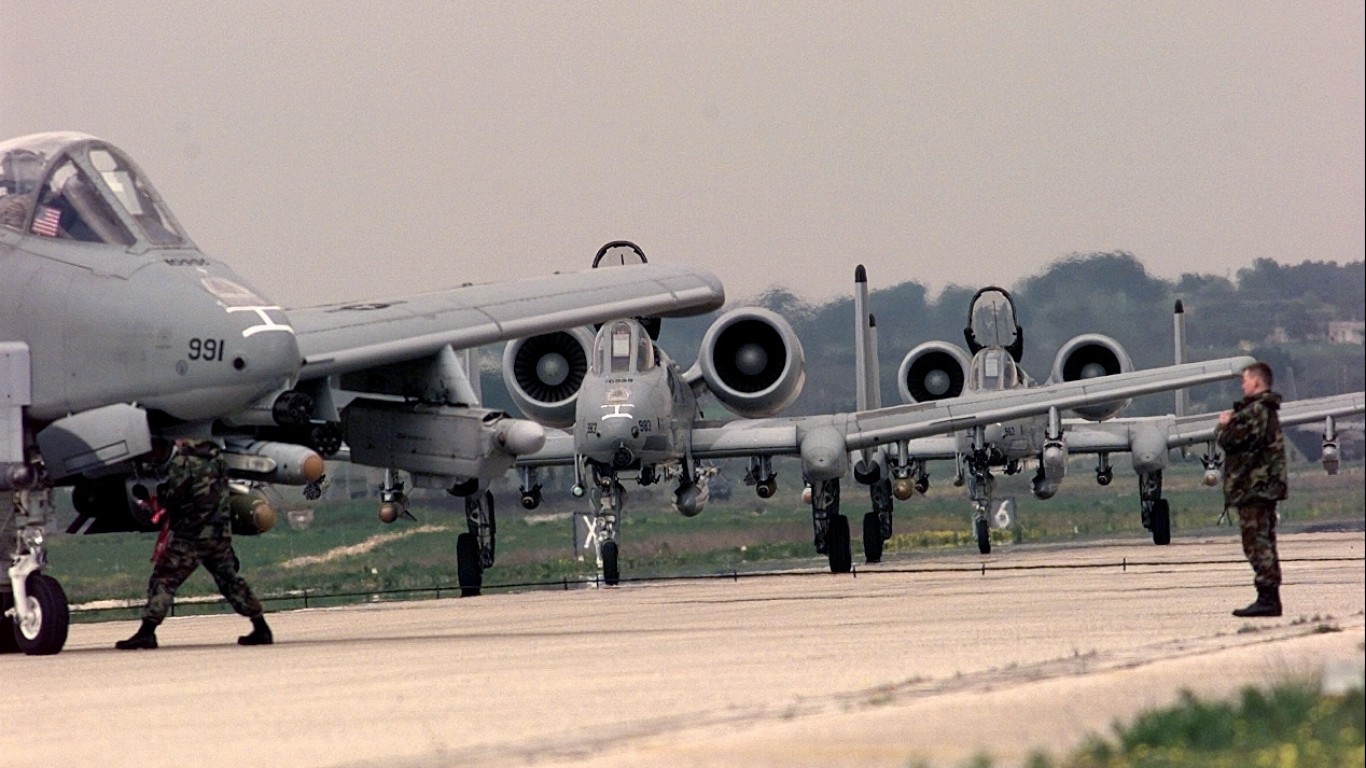
4. Italy
> Number of installations: 29
> Size:2,345 acres valued at $9.6 billion
> Largest installation: Aviano Air Base
> Italy population: 60,536,709
> GDP per capita: $35,343
Italy, an antagonist of the United States and its allies during World War II, hosts 29 installations where U.S. military forces operate. The American military presence at Aviano, the headquarters for the U.S. Air Force in Europe, began after World War II. Aviano Air Base, host to the 31st Fighter Wing, is located about 50 miles north of Venice in the Dolomite Mountains.
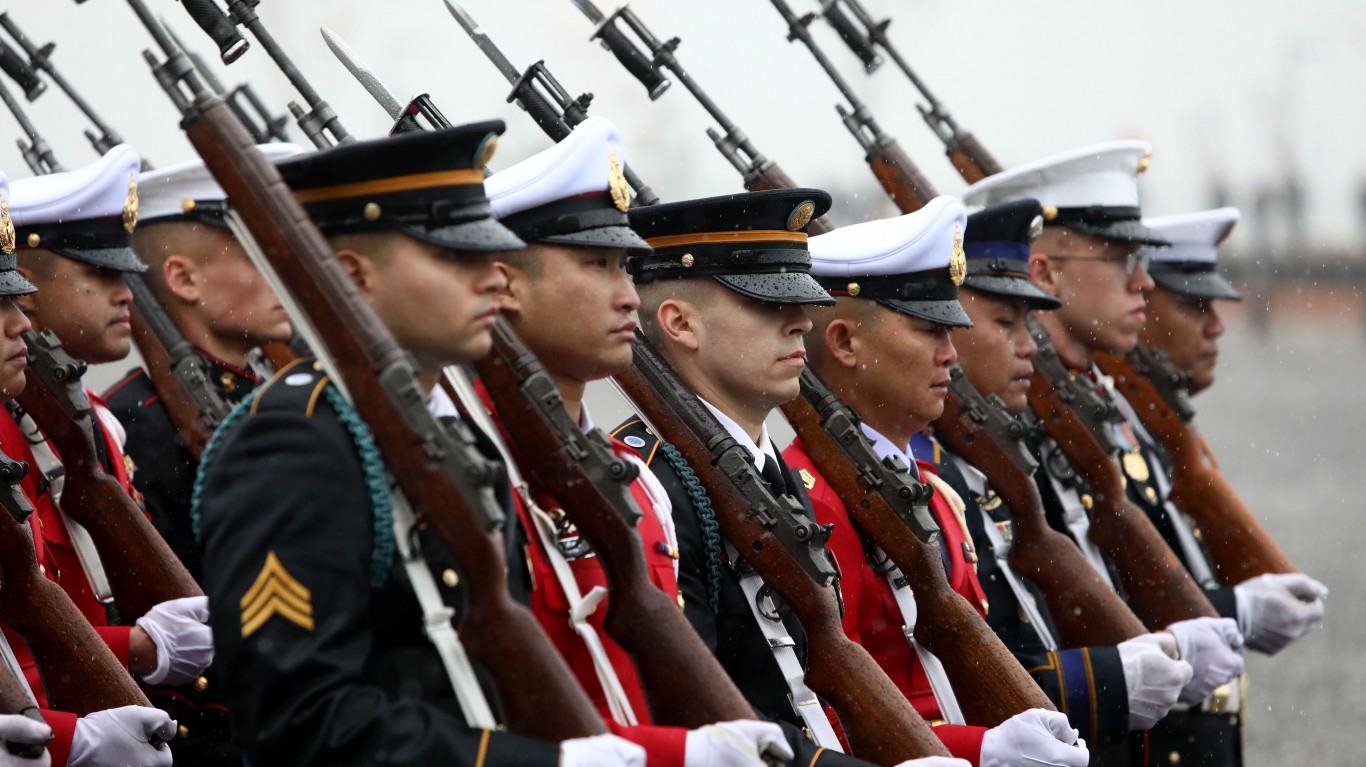
3. South Korea
> Number of installations: 64
> Size: 30,991 acres valued at $24.5 billion
> Largest installation: Pyeongtaek Cpx Area
> South Korea population: 51,466,201
> GDP per capita: $35,938
South Korea, site of some of the fiercest fighting in Asia after World War II, is home to 64 U.S. military installations. The country remains on alert for possible aggression from North Korea. Eight of the largest U.S. bases overseas are in South Korea. Last June, the U.S. military opened its largest base in South Korea in the city of Pyeongtaek. The facility is the new headquarters of the U.S. Forces Korea (USFK), named Camp Humphreys.
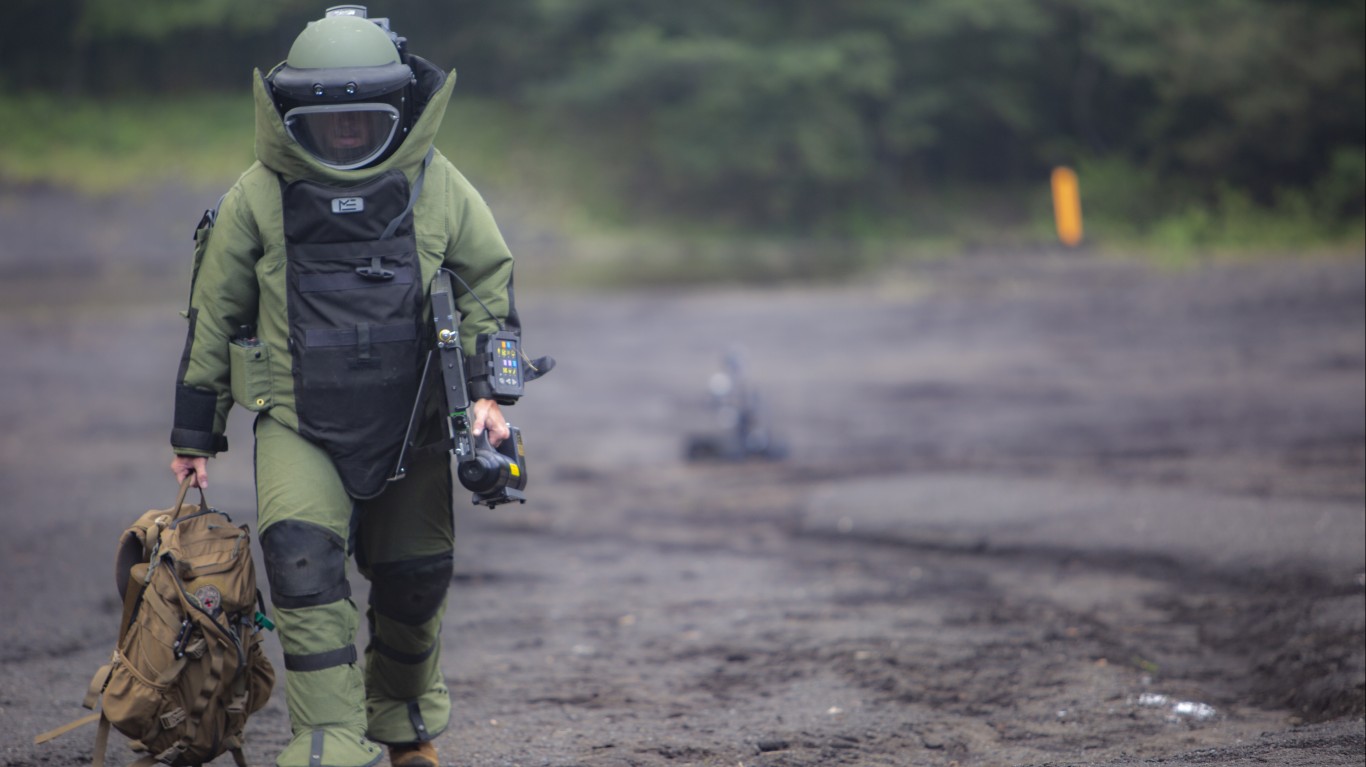
2. Japan
> Number of installations: 86
> Size: 114,981 acres valued at $98.2 billion
> Largest installation: Camp Fuji Japan
> Japan population: 126,785,797
> GDP per capita: $39,011
Japan, America’s adversary in the Pacific during World War II, has 86 facilities hosting American military personnel, more than any other nation in Asia. Some of the facilities in Japan were operated by the Japanese Empire and were taken over by the United States after World War II. Among them are the Misawa Air Base that trained pilots for the attack on Pearl Harbor and Camp Fuji, which trained samurai warriors in the 12th century. Many of those installations are on the island of Okinawa, where intense fighting took place during World War II.
[in-text-ad-2]

1. Germany
> Number of installations: 87
> Size:6,405 acres valued at $44.9 billion
> Largest installation: Ramstein Air Base
> Germany population: 82,685,827
> GDP per capita: $45,446
Germany, which fought the United States in both world wars, hosts more U.S. military bases than any other nation. Ramstein Air Base is by far the biggest U.S. military facility in Germany. The base was built in 1951 and is located near the French border. The area around Ramstein is called “little America” because of the 50,000 U.S. personnel who reside there. The second biggest base in Germany is Spangdahlem Air Base, located near the borders of Belgium and Luxembourg.
Get Ready To Retire (Sponsored)
Start by taking a quick retirement quiz from SmartAsset that will match you with up to 3 financial advisors that serve your area and beyond in 5 minutes, or less.
Each advisor has been vetted by SmartAsset and is held to a fiduciary standard to act in your best interests.
Here’s how it works:
1. Answer SmartAsset advisor match quiz
2. Review your pre-screened matches at your leisure. Check out the advisors’ profiles.
3. Speak with advisors at no cost to you. Have an introductory call on the phone or introduction in person and choose whom to work with in the future
Thank you for reading! Have some feedback for us?
Contact the 24/7 Wall St. editorial team.
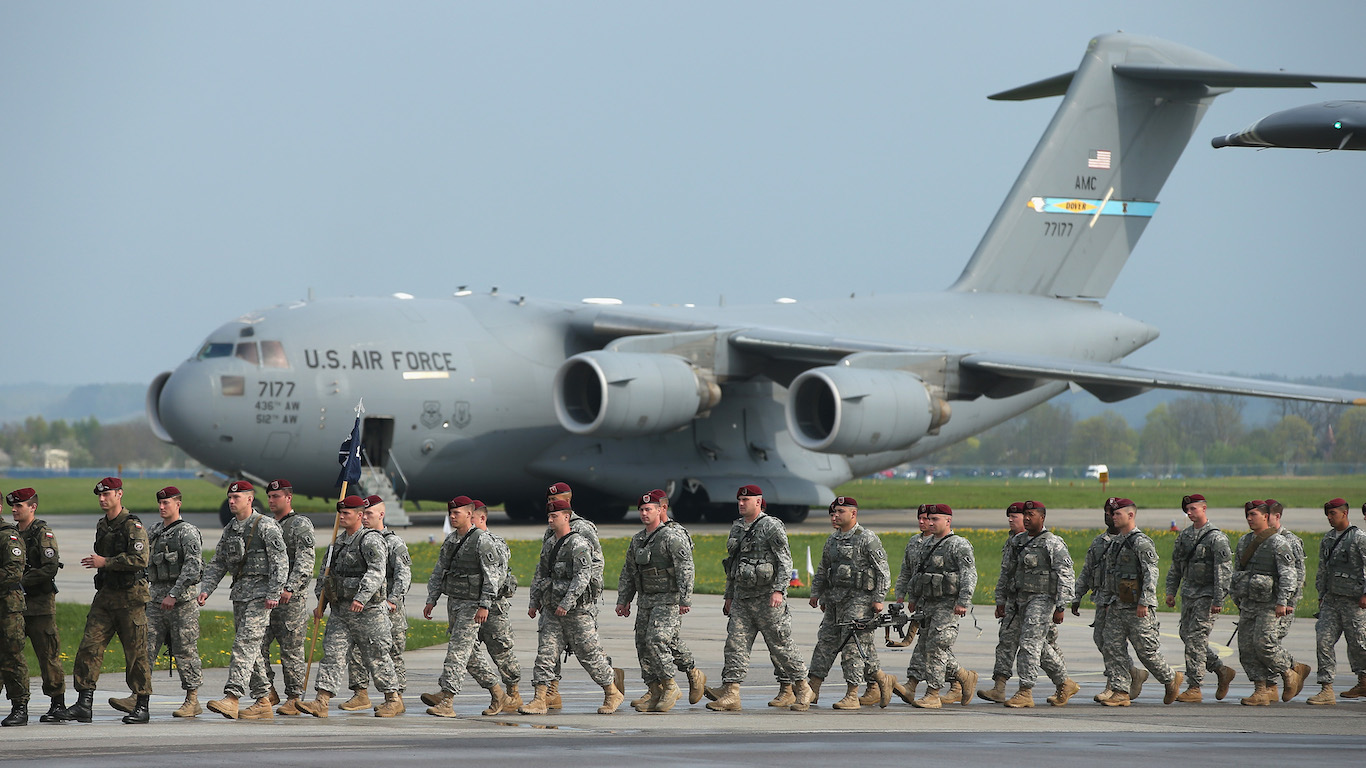 24/7 Wall St.
24/7 Wall St.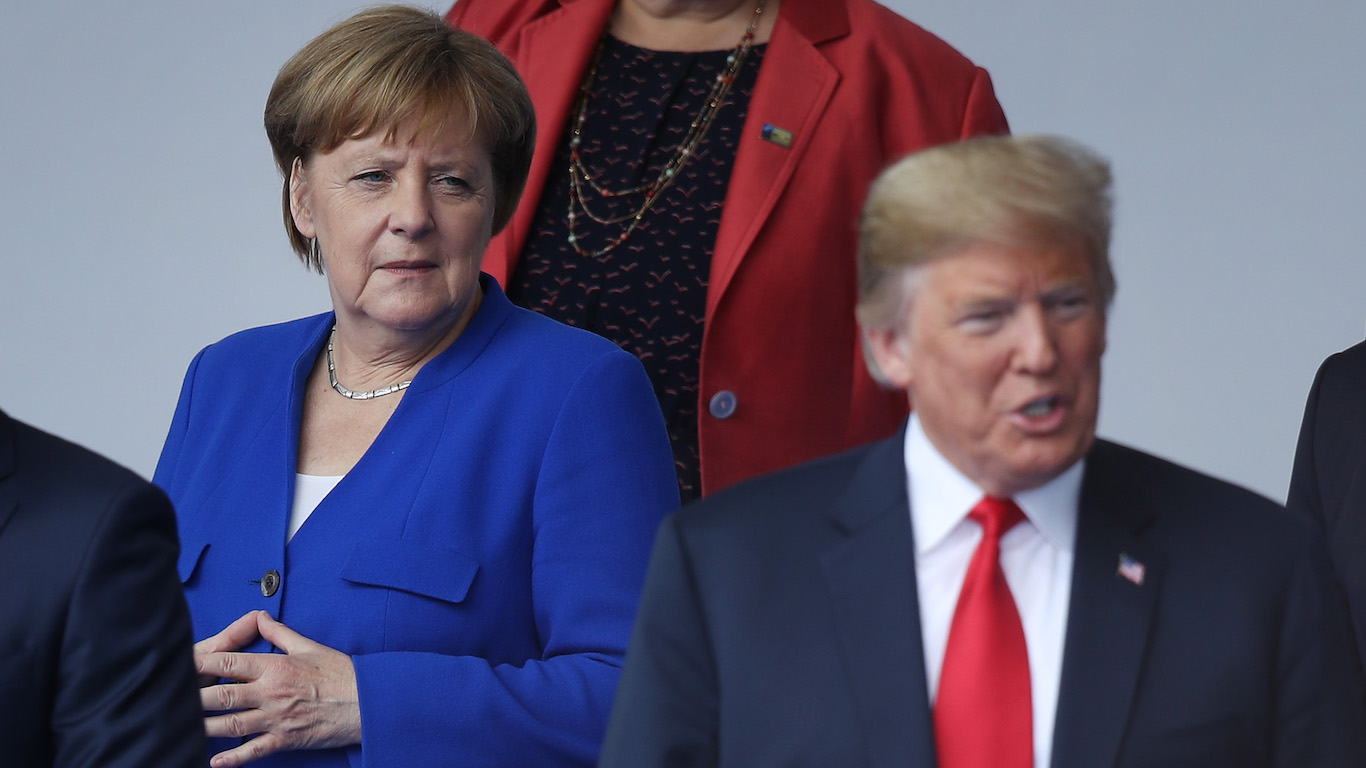 24/7 Wall St.
24/7 Wall St.
